Vetted
13 Best Books for Parenting a Child With Autism, Recommended by Experts
Turn to these expert-recommended books for powerful strategies and practical advice on parenting a child with autism, offering valuable insights for success.

Raising a child with autism can be easier with the right books. ***Parenting a Child with Autism: Modern Guide to Raising ASD Child to Success, Positive Parenting for Autism,*** and ***An Early Start for Your Child with Autism*** give advice and effective methods for supporting autistic children. ***Parents Guide to High-Functioning Autism Spectrum Disorder*** offers custom tools, while ***The Explosive Child [Sixth Edition]*** focuses on teamwork for problem-solving. Other reads like ***Connecting With The Autism Spectrum*** and ***Parenting Children with Autism – 2 in 1 Companion Collection*** dig into managing behavior and communication challenges, offering useful tips. These books are highly recommended for their expert advice on parenting a child with autism.
Key Takeaways
- Prioritize evidence-based strategies and practical advice from experts.
- Look for insights into understanding autism spectrum disorders and effective communication strategies.
- Consider books covering behavior management and educational support.
- Opt for authors with credentials in autism and child development.
- Seek expert recommendations for valuable insights tailored to children with autism.
Parenting a Child with Autism: Modern Guide to Raising ASD Child to Success

For parents newly exploring the complexities of raising a child with autism, 'Parenting a Child with Autism: Modern Guide to Raising ASD Child to Success' offers a detailed roadmap for fostering success and understanding in their journey. The book has received positive reviews for its encouraging introduction, empowering tone, and step-by-step advice tailored to parents of newly diagnosed children with ASD.
It provides thorough definitions of autism types, related diagnoses, and strategies to manage ASD behaviors while improving communication and relationships. However, critical reviews have pointed out inaccuracies regarding autism causes, diagnosis, and characteristics, as well as a negative portrayal of autism and parenting techniques.
Despite these concerns, the book remains an in-depth guide for parents new to the mental health field, offering valuable insights into managing a child's diagnosis, self-care, and understanding of autism and child psychology.
Best For: Parents of newly diagnosed children with Autism Spectrum Disorder (ASD) seeking a comprehensive guide on understanding and navigating the complexities of raising a child with autism.
Pros:
- Empowering and encouraging introduction that instills hope and confidence in parents.
- Step-by-step advice tailored to parents of newly diagnosed children with ASD.
- Detailed definitions of autism types, related diagnoses, and strategies to manage ASD behaviors effectively.
Cons:
- Contains inaccuracies about autism causes, diagnosis, and characteristics.
- Negative portrayal of autism and parenting techniques may not resonate with all readers.
- Lack of relevance for parents of older children with ASD and outdated terminology can be limiting.
Positive Parenting for Autism: Powerful Strategies to Help Your Child Overcome Challenges and Thrive
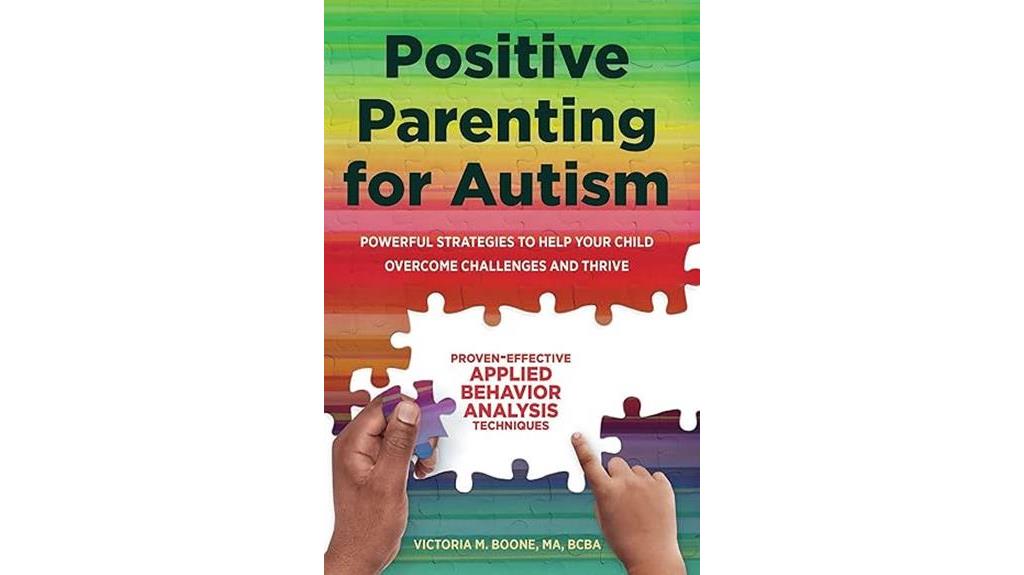
Beginning the journey of parenting a child with autism becomes more manageable with the powerful strategies and tools outlined in 'Positive Parenting for Autism.' This book has received positive feedback for its fantastic tools and techniques that help children with autism overcome challenges and thrive.
It offers real-world examples that make understanding easier, benefiting parents and caregivers seeking informative and practical advice. 'Positive Parenting for Autism' helps in comprehending the root causes of unwanted behaviors and teaches effective ways to encourage desired behaviors in children with autism.
Additionally, it provides valuable guidance on supporting autistic children and is particularly beneficial for caregivers interested in Applied Behavior Analysis (ABA). The book has been recommended by professionals and parents alike, proving to be a useful resource for those dealing with the complexities of raising a child with autism.
Best For: Parents and caregivers seeking practical strategies and tools to help children with autism overcome challenges and thrive.
Pros:
- Fantastic tools and techniques for supporting autistic children.
- Real-world examples make it easy to understand and apply.
- Valuable guidance on encouraging desired behaviors and understanding root causes of unwanted behaviors.
Cons:
- Some may find the content too basic or simple.
- Mixed opinions on the level of new information provided.
- May be challenging for some individuals to stay engaged.
An Early Start for Your Child with Autism: Using Everyday Activities to Help Kids Connect, Communicate, and Learn
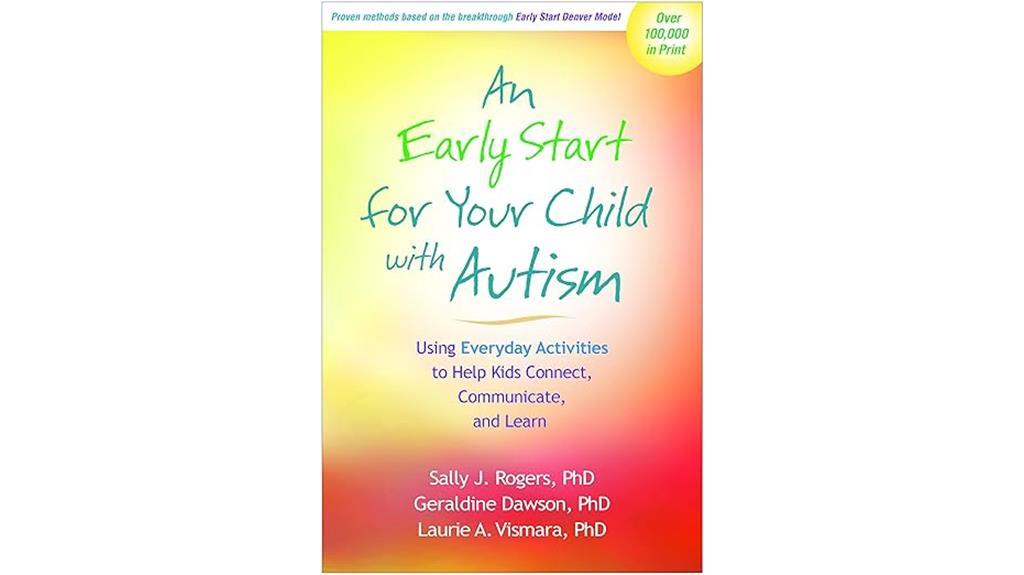
Incorporating therapy into everyday activities, 'An Early Start for Your Child with Autism' is a valuable resource for parents seeking practical strategies to support children on the autism spectrum. The book emphasizes seizing daily opportunities for learning and connection in a non-therapy-like manner. It provides evidence-based strategies and advice for enhancing a child's development, offering a reassuring and empowering tone.
Parents have shared positive experiences, noting improvements in communication skills and behavior. The book's practical techniques focus on enhancing nonverbal and social skills through naturalistic ABA methods. With real-life examples and checklists, parents can effectively implement strategies at home.
Accessible and parent-friendly, 'An Early Start for Your Child with Autism' is recommended for those seeking early intervention strategies and looking to positively impact their child's development through everyday interactions.
Best For: Parents of children on the autism spectrum seeking practical strategies to support their child's development through everyday interactions.
Pros:
- Offers evidence-based strategies and advice for enhancing a child's development.
- Provides practical techniques with real-life examples and checklists for effective implementation at home.
- Emphasizes naturalistic ABA methods to improve nonverbal and social skills in children with autism.
Cons:
- May require consistent effort and time commitment from parents to see significant results.
- Some parents may find it challenging to incorporate therapy techniques into daily routines initially.
- The book's focus on everyday interactions may not fully replace formal therapies in some cases.
Parents Guide to High-Functioning Autism Spectrum Disorder, Second Edition

The 'Parents Guide to High-Functioning Autism Spectrum Disorder, Second Edition' is an essential resource for parents managing high-functioning autism in their children. This book comes highly recommended for its practical help, real ideas, and tools tailored to parents of children with high-functioning autism.
Divided into two parts, it covers important information on HFASD, including diagnosis, causes, treatments, and strategies for living with HFASD. Part One explores understanding Autism Spectrum Disorder, while Part Two offers day-to-day advice and practical guidance.
Users have reported positive experiences, finding the book informative and insightful in handling the complexities of autism. It emphasizes the significance of correct diagnosis, advocacy, and provides practical advice for supporting children with autism from early childhood through adulthood.
Best For: Parents of children with high-functioning autism seeking practical help and guidance in understanding and supporting their child's needs.
Pros:
- Provides practical help, real ideas, and tools tailored to parents of children with high-functioning autism.
- Covers important information on HFASD, including diagnosis, causes, treatments, and strategies for living with HFASD.
- Offers day-to-day advice and practical guidance on managing behaviors and advocating for children with autism.
Cons:
- Some users found the book to be outdated in certain aspects.
- Specific sections of the book may be disturbing or not align with some cultural perspectives.
- Lack of parent support groups in small communities poses a challenge for some users.
Parenting Autism: An Autism Parenting Guide
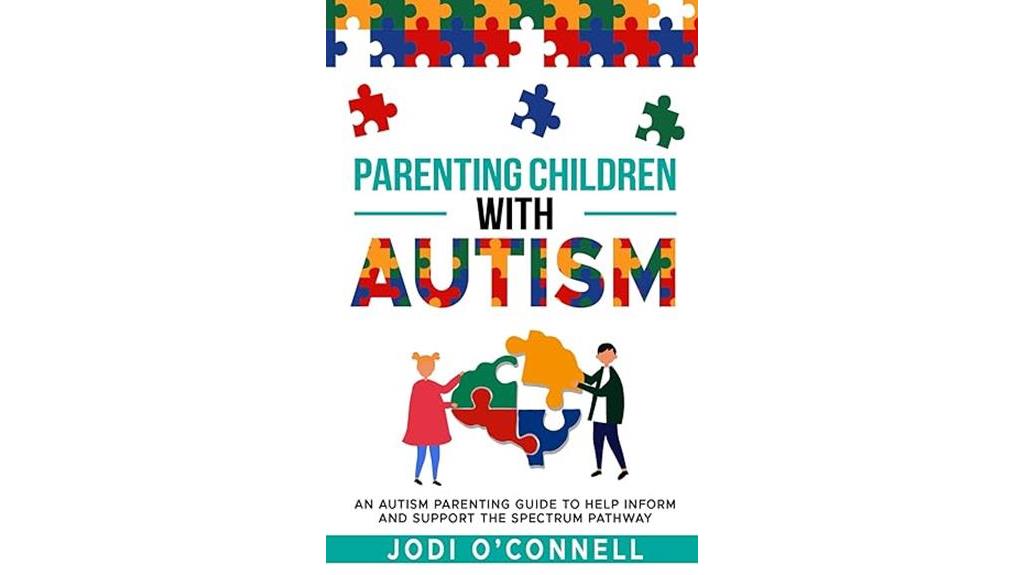
For parents managing the complexities of raising a child with autism, 'Parenting Autism: An Autism Parenting Guide' serves as a valuable and practical resource. This book offers straightforward explanations and detailed strategies that can be easily understood and implemented.
It has been highly recommended by readers for its insightful and inclusive approach to autism parenting. One of the key strengths of this guide is its emphasis on self-care, an essential aspect often overlooked by caregivers. By providing thorough guidance in a non-threatening manner, the book educates and empowers parents, helping them better understand and support their autistic children.
With a focus on improving communication and strengthening the parent-child relationship, 'Parenting Autism' is particularly beneficial for beginners in the field of autism parenting, offering clear explanations and practical recommendations to support families on their spectrum journey.
Best For: Parents new to autism parenting seeking practical guidance and clear explanations to support their autistic children effectively.
Pros:
- Offers straightforward explanations and practical strategies for immediate implementation.
- Emphasizes self-care as a crucial aspect often overlooked in autism parenting.
- Helps improve communication and strengthen the parent-child relationship.
Cons:
- Some readers may find the content basic if they are already well-versed in autism parenting.
- Personal experiences and anecdotes could be more varied for a broader perspective.
- Limited focus on specific challenges faced by older autistic individuals.
Parenting a Child with Autism Spectrum Disorder
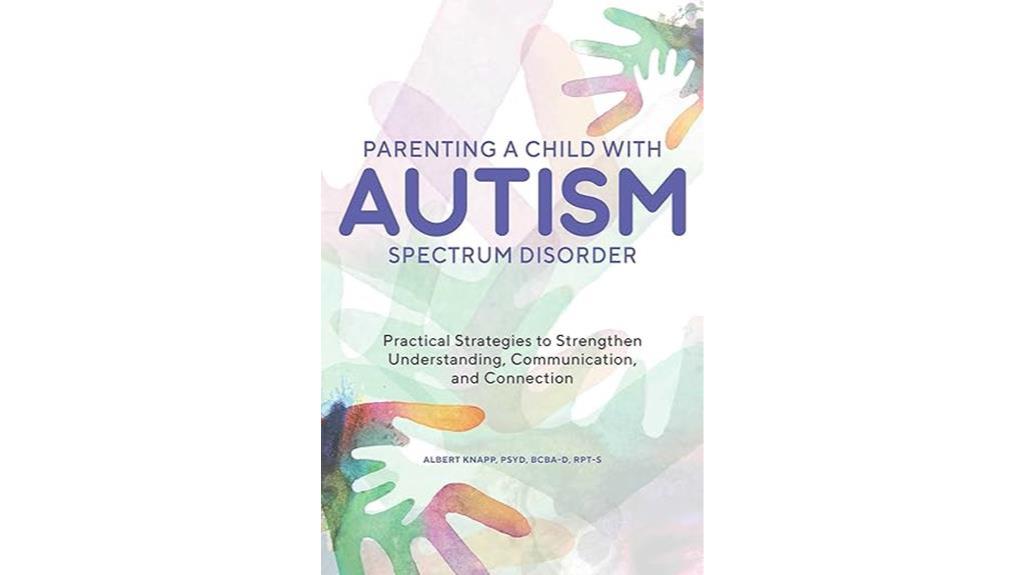
Managing the complexities of parenting a child with Autism Spectrum Disorder can be made more manageable with the practical strategies and insights provided in the book 'Books for Parenting a Child With Autism.' This resource offers easy-to-understand suggestions for parents dealing with the challenges of raising a child with ASD.
Readers appreciate Dr. Knapp's engaging writing style and find the book helpful in understanding and supporting children with autism, regardless of the severity of their condition. Practical strategies in the book aim to strengthen communication, understanding, and connection with children on the spectrum.
Dr. Knapp's passion for aiding children with autism shines through, offering valuable tools for families and professionals alike. The book covers a wide range of difficulties faced by children with ASD, providing real-life examples and empowering tips for families.
Best For: Parents seeking practical guidance and support in understanding and connecting with their child with Autism Spectrum Disorder.
Pros:
- Easy-to-understand suggestions and practical strategies for parenting a child with ASD.
- Engaging writing style of Dr. Knapp that aids in better comprehension and application of the book's content.
- Valuable insights and real-life examples provided to empower families and professionals in supporting children with autism.
Cons:
- The book may not delve deeply into specific, individualized approaches for children with unique needs.
- Some readers may find the content repetitive or lacking in new, groundbreaking strategies.
- Limited focus on addressing the emotional and mental well-being of parents and caregivers navigating ASD parenting challenges.
Ten Things Every Child with Autism Wishes You Knew: Revised and Updated
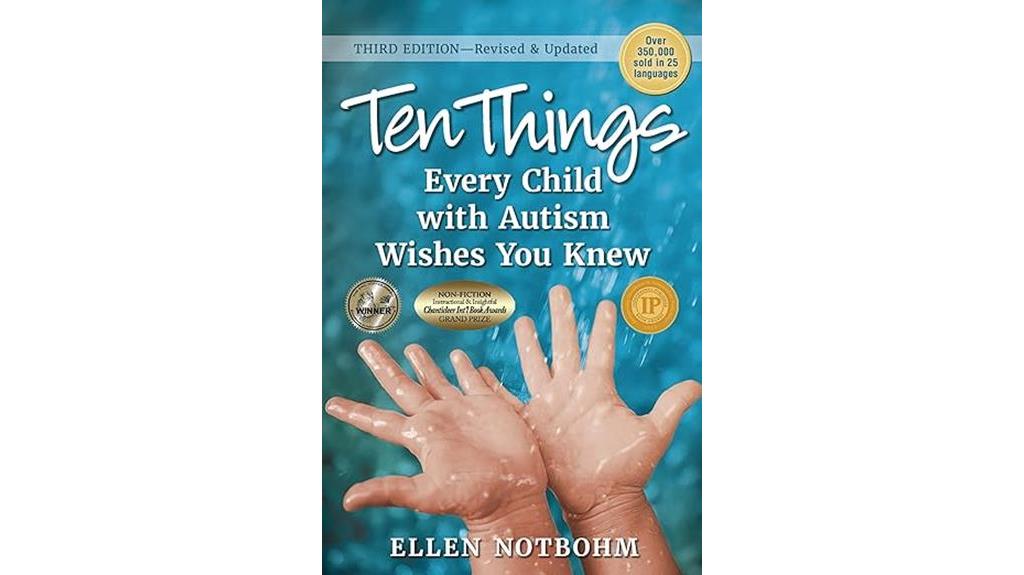
Discover essential insights and practical advice in 'Ten Things Every Child with Autism Wishes You Knew: Revised and Updated', a valuable resource recommended for parents, family members, and educators seeking a deeper understanding of autism.
This book has garnered positive reviews for its clarity and the valuable insights it offers. Readers have found it to be easy to understand, helping them grasp the complexities of autism and providing practical recommendations for daily interactions.
By delving into the unique perspective of children with autism, the book sheds light on aspects that may not have been previously considered. Readers have shared how it assisted them in maneuvering the challenges associated with autism, making it a highly recommended read for those looking to enhance their understanding and support for individuals on the spectrum.
Best For: Parents, family members, and educators seeking a deeper understanding of autism.
Pros:
- Easy to read and understand, providing valuable insights.
- Practical recommendations for daily interactions with autistic children.
- Helps in grasping the complexities of autism and enhancing support for individuals on the spectrum.
Cons:
- Limited focus on specific strategies for certain challenges related to autism.
- Some readers may find the content repetitive if already familiar with autism.
- May not delve deeply into certain lesser-known aspects of autism.
Uniquely Human: Updated and Expanded: A Different Way of Seeing Autism

Exploring a fresh perspective on understanding autism, 'Uniquely Human: Updated and Expanded: A Different Way of Seeing Autism' offers invaluable insights for parents traversing the journey of raising a child with autism. Dr. Prizant challenges traditional views of autism, emphasizing the importance of interpreting behaviors as meaningful communication.
By sharing real-life examples, the book demystifies autism and encourages readers to see autistic individuals as inherently human. Practical suggestions for creating supportive environments have proven transformative for parents, caregivers, educators, and professionals, leading to improved interactions and developmental outcomes.
The book's impact extends beyond individual families, with professionals integrating its principles into their practices to better support neurodiverse individuals. While receiving high praise for its unique approach, some readers have noted minor critiques, but overall, 'Uniquely Human' is lauded for its valuable insights into autism and communication variations.
Best For: Parents, caregivers, educators, and professionals seeking a fresh and insightful perspective on autism and communication variations.
Pros:
- Offers valuable insights into understanding autism as a form of communication.
- Provides practical suggestions for creating supportive environments for autistic individuals.
- Encourages a shift in perspective towards viewing behaviors as meaningful communication.
Cons:
- Some readers may have preferences regarding the use of person-first language.
- Quality of the book's physical format may be subject to individual preferences.
- Minor critiques have been noted, but do not detract from the overall valuable insights provided.
The Essential Autism Parenting Handbook
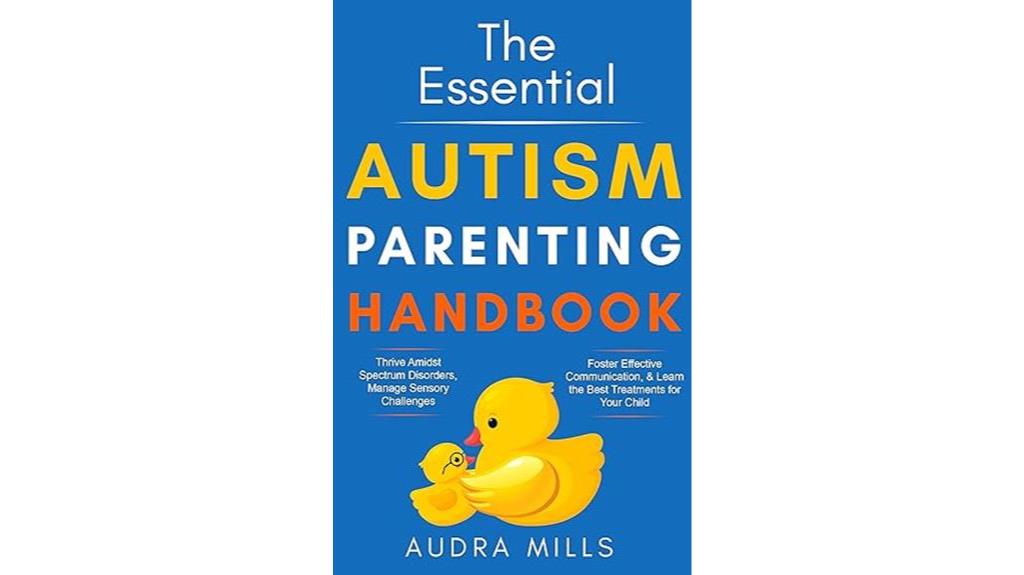
For parents seeking practical strategies and holistic guidance in raising a child with autism, 'The Essential Autism Parenting Handbook' is a valuable resource. This book covers managing sensory challenges, fostering effective communication, and exploring treatment options for children on the autism spectrum.
It takes a thorough approach, recognizing individual needs and strengths while offering practical strategies to help children reach their full potential. Readers have found the book insightful, helpful, and informative, making it a recommended read for parents of autistic children, individuals looking to understand autism spectrum disorders better, and anyone aiming to improve communication with those on the spectrum.
Emphasizing community support, the book discusses safety measures at home and in the community, underlining the importance of educating neighbors about the child's condition. With personal stories and practical guidance on treatments, activities, and communication strategies, this handbook is a detailed tool for supporting and understanding children with autism.
Best For: Parents of autistic children, individuals seeking a deeper understanding of autism spectrum disorders, and those looking to enhance communication with individuals on the spectrum.
Pros:
- Comprehensive coverage of managing sensory challenges, communication strategies, and treatment options for children with autism.
- Insightful and informative content that is helpful for parents and individuals wanting to support autistic children.
- Emphasis on community involvement and safety measures, promoting a holistic approach to raising a child with autism.
Cons:
- May require additional resources or professional guidance for implementing some of the strategies and treatments suggested.
- Personal stories and experiences shared in the book may not resonate with every reader.
- Not a replacement for personalized professional advice or individualized therapy for children with autism.
The Reason I Jump: The Inner Voice of a Thirteen-Year-Old Boy with Autism
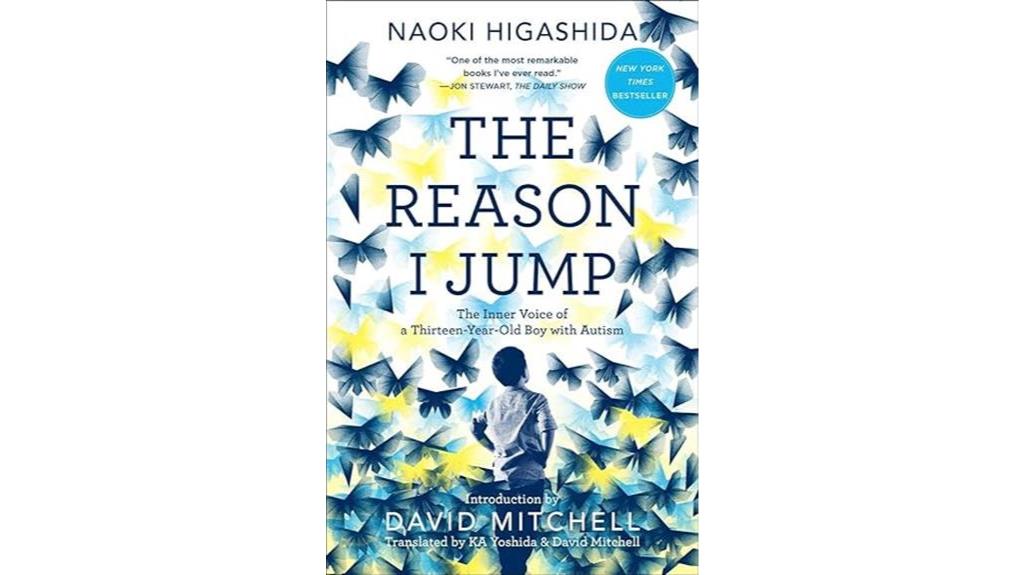
In parenting a child with autism, 'The Reason I Jump: The Inner Voice of a Thirteen-Year-Old Boy with Autism' offers a poignant insight into the experiences and perspectives of autistic individuals, providing valuable understanding for caregivers and professionals alike.
This biography, written by Naoki Higashida, a non-verbal 13-year-old boy with autism, explores the reasons behind various behaviors associated with autism. Higashida's explanations offer a deeper understanding of the challenges faced by autistic individuals in social situations, highlighting the importance of empathy and seeing the world through their eyes.
Readers, including parents and professionals, have found the book to be eye-opening, changing their perspectives and interactions with autistic individuals. Testimonials emphasize the book's ability to inspire empathy and foster meaningful connections with those on the autism spectrum, making it a recommended read for a wide audience seeking to learn more about autism.
Best For: Parents, caregivers, and professionals wanting a deeper understanding of autism and seeking to improve their interactions with autistic individuals.
Pros:
- Offers valuable insights into the experiences and perspectives of autistic individuals.
- Encourages empathy and understanding towards individuals on the autism spectrum.
- Written from the perspective of a non-verbal 13-year-old boy with autism, providing a unique and authentic view.
Cons:
- May not cover the full spectrum of experiences and challenges faced by all individuals with autism.
- Perspectives shared may vary from person to person, as autism is a spectrum disorder.
- Some readers may find the writing style, reflecting a 13-year-old's voice, challenging to follow at times.
Connecting With The Autism Spectrum: How To Talk, How To Listen, And Why You Shouldn't Call It High-Functioning
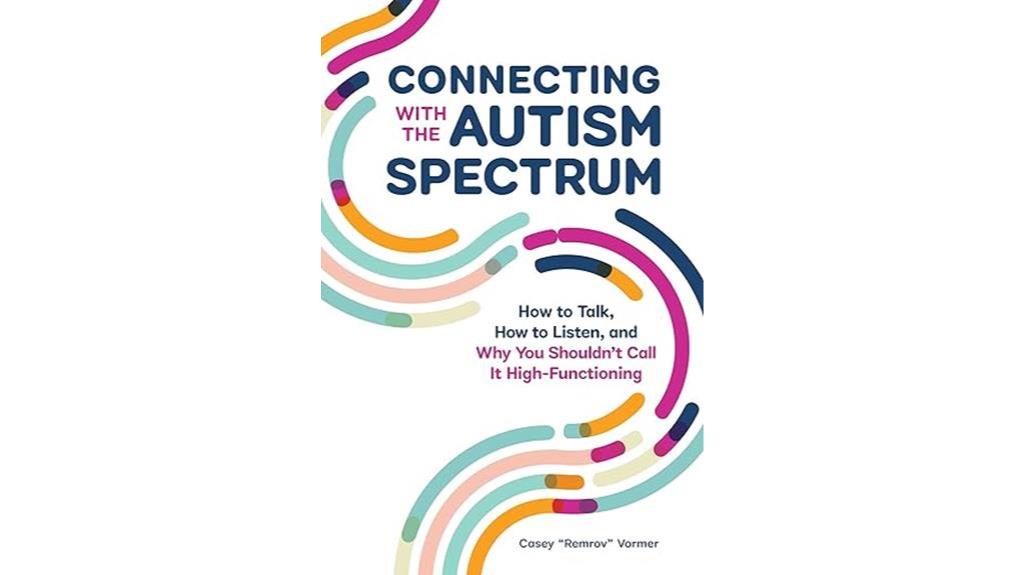
Understanding how to communicate effectively with individuals on the autism spectrum is essential for parents raising a child with autism, as highlighted in the book 'Connecting with the Autism Spectrum' by Casey Vormer.
This book offers valuable insights into autism from an autistic perspective, providing practical tips for improving communication with individuals on the spectrum. Readers appreciate the emphasis on empathy, acceptance, and understanding differences, which are key aspects of connecting with loved ones who've autism.
By encouraging open-mindedness and celebrating the strengths of all individuals, 'Connecting with the Autism Spectrum' promotes a deeper understanding of autism and how to interact more effectively with individuals on the spectrum. It's a recommended read for parents, caregivers, and anyone seeking to gain a better understanding of autism from an autistic viewpoint.
Best For: Parents, caregivers, and individuals seeking a deeper understanding of autism from an autistic perspective.
Pros:
- Offers valuable insights into autism from an autistic viewpoint.
- Emphasizes empathy, acceptance, and understanding differences for better communication.
- Encourages open-mindedness and celebrates the strengths of individuals on the spectrum.
Cons:
- Some readers may find the book dense at times.
- Diverse perspectives within the autism community might be overwhelming for those new to the topic.
- Covers a wide range of topics, which can make it challenging to focus on specific areas for some readers.
Parenting Children with Autism – 2 in 1 Companion Collection
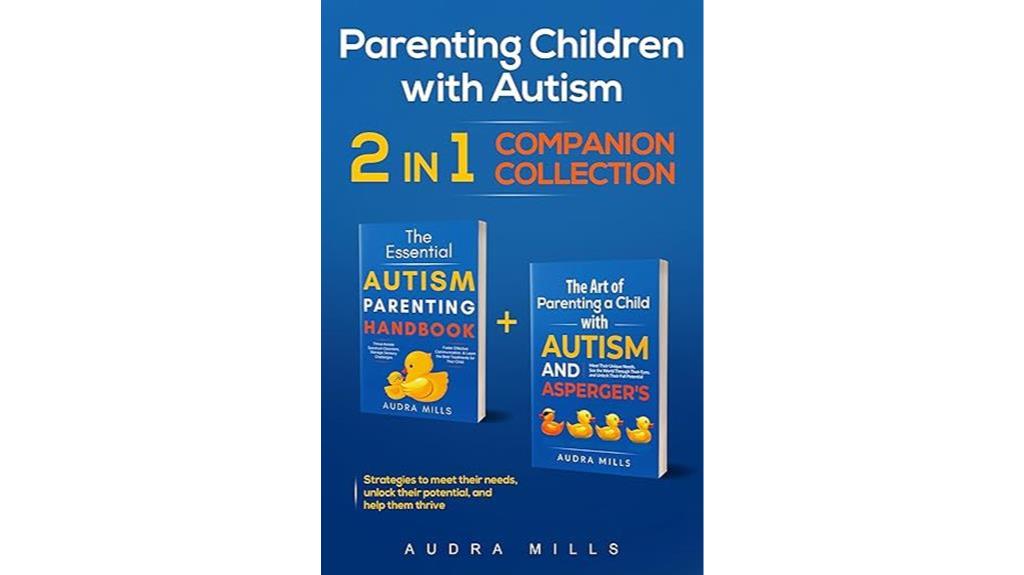
Understanding the world of parenting a child with autism becomes more manageable with the practical advice and insights offered in the 'Parenting Children with Autism – 2 in 1 Companion Collection'. This book provides a wealth of information on managing behavior, sensory issues, communication challenges, and educational obstacles commonly faced by parents raising children with autism.
It covers various treatment options, offers potty training tips, and guides parents on advocating for their child at school. Described as well-organized and filled with invaluable guidance, this book emphasizes empowerment, practical tools, and strategies to help children with autism thrive.
With extensive coverage on different diagnoses, communication approaches, behavior management, and educational strategies, this book serves as a vital resource for parents embracing the complex world of autism. Highly recommended by readers, it's seen as an essential resource for understanding and supporting children on the autism spectrum.
Best For: Parents seeking practical advice, empowerment, and comprehensive information to understand and support their children with autism.
Pros:
- Provides practical advice on managing behavior, sensory issues, communication challenges, and educational obstacles.
- Emphasizes empowerment and offers practical tools to help children with autism thrive.
- Comprehensive coverage on different diagnoses, communication approaches, behavior management, and educational strategies.
Cons:
- May not delve deeply into specific individualized needs of every child with autism.
- Some readers may prefer more personal anecdotes and stories to connect with the content.
- Limited focus on the challenges faced by older children and adolescents with autism.
The Explosive Child [Sixth Edition]: A New Approach for Understanding and Parenting Easily Frustrated, Chronically Inflexible Children
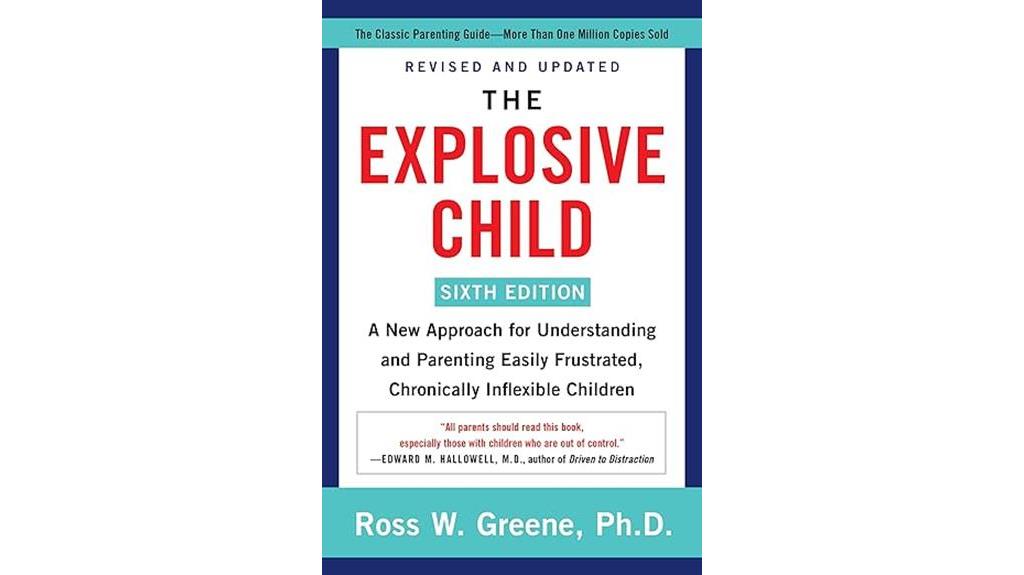
For parents maneuvering the complexities of raising a child with autism, 'The Explosive Child [Sixth Edition]' offers a transformative approach to understanding and parenting easily frustrated, chronically inflexible children. The book introduces Collaborative Problem Solving (CPS) as a method to address behaviorally challenging children by focusing on lagging skills and empathetic resolutions.
It emphasizes a rational approach, combining reflective listening with problem-solving techniques, rather than relying on traditional rewards and punishments. 'The Explosive Child' advocates for tackling unsolved issues through empathetic conversations, encouraging realistic solutions from the child. Readers have found this approach impactful in dealing with intense conflicts and ineffective behavioral strategies.
While the book may not suit very young children or those with developmental delays, it provides concrete steps and examples for creating a safe environment and connecting with the child through corrective methods.
Best For: Parents of behaviorally challenging children seeking a collaborative and empathetic approach to understanding and addressing their child's frustrations.
Pros:
- Utilizes Collaborative Problem Solving (CPS) to address behaviorally challenging children.
- Emphasizes addressing lagging skills and unresolved issues through empathy and conversation.
- Provides practical steps and examples for creating a safe and connected environment for the child.
Cons:
- May not be suitable for very young children or those with developmental delays.
- Does not focus on traditional reward and punishment behavioral modification techniques.
- Some readers may find the institutional focus limiting in certain contexts.
Factors to Consider When Choosing Books for Parenting a Child With Autism

When choosing books for parenting a child with autism, it's essential to take into account various factors. We should prioritize practicality, ensuring that the content can be applied in real-life situations.
Expert recommendations play a vital role, addressing specific challenges and offering diverse perspectives to meet the unique needs of both parents and children.
Selection Criteria for Books
When selecting books for parenting a child with autism, it's crucial to prioritize evidence-based strategies and practical advice to effectively navigate the challenges of raising a child on the spectrum.
Look for books that offer insights into understanding autism spectrum disorders and effective communication strategies. Consider choosing books that cover a range of topics related to autism, including behavior management and educational support.
Opt for books that incorporate personal experiences, real-life examples, and recommendations from professionals to enhance your understanding. It's important to pick books that emphasize empowerment, support, and provide practical tools for parents.
Check the credentials and expertise of the author in the field of autism and child development to confirm credibility. Additionally, seek out books that align with your parenting style, values, and goals for your child.
Focus on Practicality
To ensure practicality in selecting books for parenting a child with autism, we prioritize actionable strategies and real-life examples that can be easily applied in daily life. When choosing a book, look for ones that offer step-by-step guidance and practical advice for managing behaviors and supporting your child's development.
Seek out resources that address specific challenges your child may be facing, such as communication difficulties or sensory sensitivities. Picking books that empower you as a parent by providing practical tools and strategies tailored to the unique needs of your child with autism is crucial. Opt for materials that emphasize the importance of consistency, patience, and understanding in parenting a child with autism.
Additionally, consider books that offer evidence-based information and strategies endorsed by experts in the field of autism. By focusing on practicality and real-life application, you can better equip yourself with the knowledge and skills needed to support your child effectively.
Expert Recommendations Importance
Expert recommendations play an essential role in guiding parents on selecting books for parenting a child with autism. These recommendations are vital because they offer valuable insights and evidence-based suggestions from professionals in the field. By following expert advice, parents can access strategies, interventions, and resources tailored to their child's specific needs, helping them navigate the vast array of available information.
Professionals in the autism community can suggest books aligned with current best practices and research, enabling parents to make informed decisions that suit their child's unique challenges and strengths. Recommendations from psychologists, therapists, and educators make certain that the information in the books is evidence-based and practical, providing effective strategies for improving the well-being of children with autism.
Expert-recommended books also offer guidance on understanding and addressing the unique challenges and strengths of children with autism, further underscoring the importance of expert recommendations in selecting the most beneficial resources.
Addressing Specific Challenges
How can we identify books that effectively address the specific challenges faced by children with autism?
When selecting books for parenting a child with autism, it's important to take into account the unique difficulties your child may encounter, such as communication obstacles, sensory sensitivities, or behavioral issues. Look for resources that offer practical strategies and techniques tailored to your child's individual needs and strengths.
Choose books that provide guidance on managing common challenges like meltdowns, changes, social skills, and academic support. Seek out insights into understanding your child's perspective and promoting positive interactions within the family and community.
Opt for books that resonate with your parenting style and values while offering evidence-based approaches to supporting children with autism. Consider titles authored by experts in the field of autism or individuals with personal experience in parenting a child with autism.
Diverse Perspectives Inclusion
When selecting books for parenting a child with autism, considering diverse perspectives in inclusion can offer a more thorough understanding of the spectrum and effective strategies for support. Diverse perspectives encompass insights from individuals with autism, parents, caregivers, educators, and professionals. By representing various viewpoints, readers can gain a broader understanding of autism and effective strategies for support.
This inclusion promotes accuracy in portraying the experiences of individuals on the spectrum and fosters a more holistic approach to addressing their needs and those of their families. Books that prioritize diversity offer valuable information on how to support children with autism from various backgrounds and identities.
Caregivers can better understand and meet the unique needs of their child with autism through inclusive parenting resources that address cultural differences, socioeconomic factors, and other important aspects of their child's identity. Considering diverse perspectives when choosing parenting books for children with autism can lead to more thorough and effective support for both the child and their family.
Reader Engagement Strategies
When choosing books for parenting a child with autism, it's essential to explore reader engagement strategies that improve comprehension and promote active involvement in the learning process.
To effectively engage readers, incorporating real-life examples and relatable scenarios related to parenting a child with autism can make the content more relatable and applicable.
Interactive elements such as reflective questions, exercises, and activities encourage reader participation and self-reflection, enhancing the learning experience.
Visual aids like charts, diagrams, and illustrations can help simplify complex concepts and provide a clearer understanding for readers.
Additionally, including personal stories and testimonials from parents and professionals can create an emotional connection, fostering empathy and understanding.
Practical tips, checklists, and step-by-step guides offer actionable advice that readers can apply in real-life situations with their child, making the information more accessible and useful.
Real-Life Application Emphasis
Books for parenting a child with autism that emphasize real-life application provide practical strategies and examples for parents to implement in their daily interactions with their child. These books focus on translating theoretical knowledge into actionable steps that parents can take to support their child effectively.
By offering practical guidance and hands-on activities, they help parents navigate real-world challenges and situations they may encounter. The goal of highlighting real-life application is to empower parents with tools and strategies they can use in their day-to-day interactions with their child with autism.
Through practical examples and case studies, these books provide valuable insights into managing everyday challenges. Understanding how strategies work in real-life situations can boost parents' confidence in their ability to support their child effectively.
Emphasizing real-life application ensures that parents can see immediate benefits and changes in their child's behavior and development, making these books essential resources for parents raising a child with autism.
Holistic Approach Benefits
Considering a well-rounded approach is essential when selecting resources for parenting a child with autism, as it allows for thorough support across all aspects of the child's well-being.
A holistic approach to parenting a child with autism entails addressing the physical, emotional, and social needs of the child. By thoroughly tackling the child's strengths and challenges, parents can promote overall development and improve their quality of life.
This approach emphasizes creating a supportive environment not only at home but also in school and the community to enhance the child's success. Collaboration between parents, educators, therapists, and other professionals is encouraged to provide integrated support tailored to the child's unique needs.
Frequently Asked Questions
How Can I Help My Child With Autism Build Social Connections?
To help a child with autism build social connections, we focus on fostering social skills through practice and guidance.
Encourage interactions with peers in structured settings to develop communication abilities. Role-playing scenarios can aid in understanding social cues and responses.
Utilize visual aids like social stories to explain social norms and expectations. Consistent positive reinforcement and patience are key in supporting the child's progress in social interactions.
Are There Specific Strategies for Managing Sensory Sensitivities in Children With Autism?
Managing sensory sensitivities in children with autism involves creating a sensory-friendly environment. This includes minimizing loud noises, bright lights, and strong smells.
Providing sensory tools like headphones, sunglasses, or fidget toys can help regulate sensory input. Establishing routines and schedules can also offer predictability.
Consultation with an occupational therapist or sensory integration specialist can provide tailored strategies for managing specific sensitivities. Understanding and accommodating sensory needs is essential for supporting children with autism.
What Are the Best Ways to Support My Child's Communication Development?
When supporting our child's communication development, we prioritize consistent and clear verbal cues. We engage in daily activities that encourage language use, like narrating tasks and asking open-ended questions.
Building a structured routine aids in comprehension. Utilizing visual aids, such as picture schedules or communication boards, enhances understanding. We actively listen, provide positive reinforcement, and seek professional guidance when needed.
Patience and repetition play key roles in fostering communication skills effectively.
How Can I Navigate Challenging Behaviors in My Child With Autism?
When addressing challenging behaviors in our child with autism, it's essential to establish clear routines and consistent expectations.
We should also utilize positive reinforcement techniques to encourage desirable behaviors.
Seeking guidance from professionals, such as behavior analysts or therapists, can provide valuable strategies tailored to our child's specific needs.
Are There Resources Available for Parents to Prioritize Self-Care While Caring for a Child With Autism?
When it comes to resources for parents juggling the care of a child with autism alongside their own well-being, the good news is, there are several options available.
From online support groups to local community organizations, finding time for self-care is within reach.
Conclusion
In the journey of parenting a child with autism, books can serve as guiding lights, offering valuable insights and strategies to navigate the challenges and celebrate the successes.
Like a beacon in the night, these recommended reads illuminate the path forward, empowering parents to support their child with love, understanding, and resilience.
With the right resources at hand, families can commence on this unique adventure with confidence and hope for a bright future ahead.
Vetted
15 Best Mindful Parenting Books Every Parent Should Read
Kickstart your mindful parenting journey with these 15 essential books, offering insights and strategies to navigate the challenges of raising children with mindfulness.

**Exploring** mindful parenting books really **boosts** your parenting journey. Must-reads include **”Raising Good Humans”**, which helps you ditch reactive habits, **”Mindful Birthing”**, offering a whole mind-body birth method, and **”Being at Your Best When Your Kids Are at Their Worst”**, packed with practical compassion tips. **”Parenting at Your Best”** shares amazing insights. When choosing from the many options, consider content and how engaging they are. These books give priceless strategies to grow a mindful parenting style.
Key Takeaways
- "Raising Good Humans" offers practical advice for mindful parenting.
- "Mindful Discipline" emphasizes emotional intelligence in parenting.
- "Mindful Birthing" focuses on training the mind, body, and heart.
- "Growing Up Mindful" provides insights on raising mindful children.
- "Parenting from the Inside Out" explores self-understanding in raising thriving kids.
Raising Good Humans: A Mindful Guide to Breaking the Cycle of Reactive Parenting
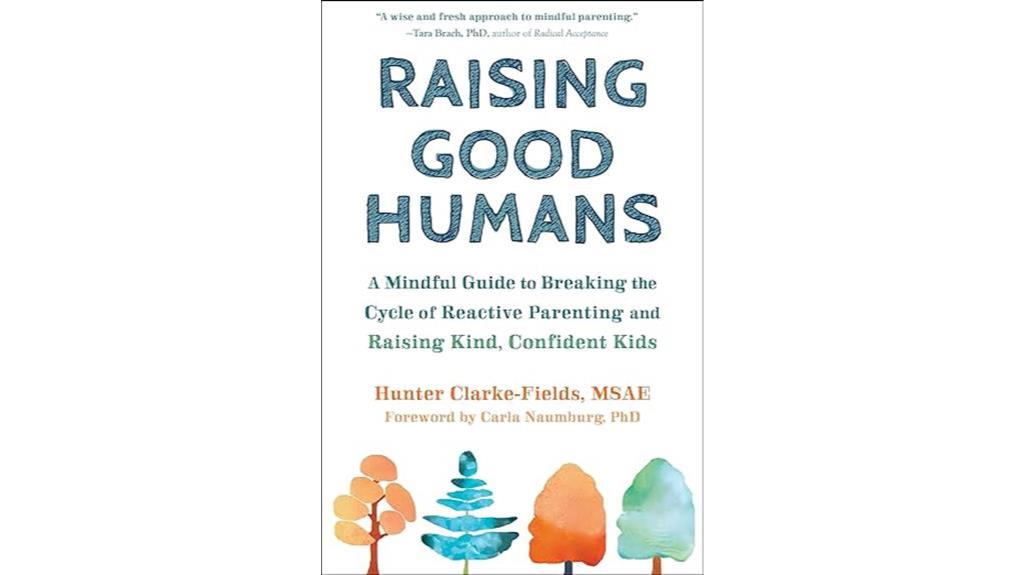
For those seeking insightful guidance on breaking the cycle of reactive parenting and fostering mindful relationships with their children, 'Raising Good Humans' is an invaluable resource. This book has received positive reviews and recommendations for its engaging and helpful approach, making it a must-read for all parents, especially first-timers.
Readers highlight the importance of self-work and patience in parenting, showing how this book can positively impact one's parenting style. Many readers mention how the strategies provided in 'Raising Good Humans' have helped them navigate challenging moments with their children, ultimately leading to more confident kids.
Despite some challenges in unlearning past parenting habits, the emphasis on self-work and mindfulness practices in this book has proven to be transformative for many.
Best For: Parents looking to break the cycle of reactive parenting and develop mindful relationships with their children.
Pros:
- Insightful guidance for improving parenting skills.
- Valuable strategies for handling difficult moments with children.
- Emphasis on self-work and mindfulness practices for personal growth.
Cons:
- Some readers may find it challenging to unlearn past parenting habits.
- Initial difficulty in approaching mindfulness practices for a few readers.
- Requires consistent effort and self-reflection, which may be demanding for some.
Mindful Parenting for ADHD Guide
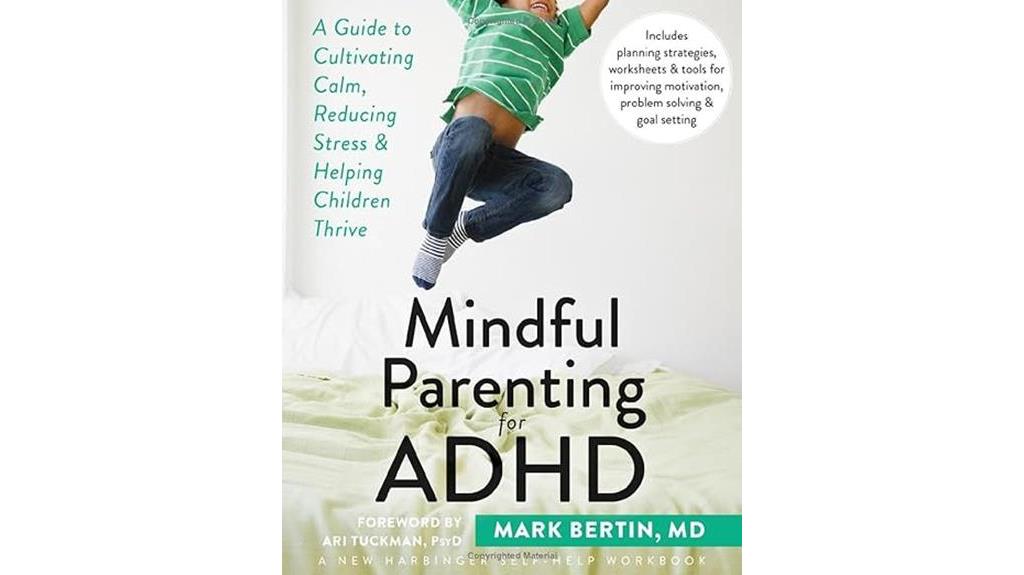
The 'Mindful Parenting for ADHD' guide is an invaluable resource recommended for parents managing the challenges of raising children with ADHD. This book offers a unique and practical approach, providing insightful advice alongside worksheets and action plans.
It covers essential topics such as organization techniques, homework plans, and academic support, emphasizing the importance of aiding children with ADHD in their learning journey. Medical professionals regard it as groundbreaking, contributing to a better understanding of ADHD as a developmental brain delay.
The book also focuses on practical guidance, offering easy-to-follow suggestions for effective parenting skills and communication strategies. By integrating mindfulness practices, it helps parents become more mindful individuals, fostering calm, improved focus, self-regulation, and compassion in handling the complexities of raising children with ADHD.
Best For: Parents of children with ADHD seeking practical guidance and support in mindful parenting techniques.
Pros:
- Comprehensive advice and worksheets for organization and academic support.
- Integration of mindfulness practices for improved focus and compassion.
- Easy-to-follow suggestions for effective parenting skills and communication strategies.
Cons:
- May require consistent practice and dedication to see significant results.
- Not all strategies may work for every child with ADHD.
- Additional support or resources may be needed for more complex cases.
Mindful Birthing: Training the Mind, Body, and Heart for Childbirth and Beyond
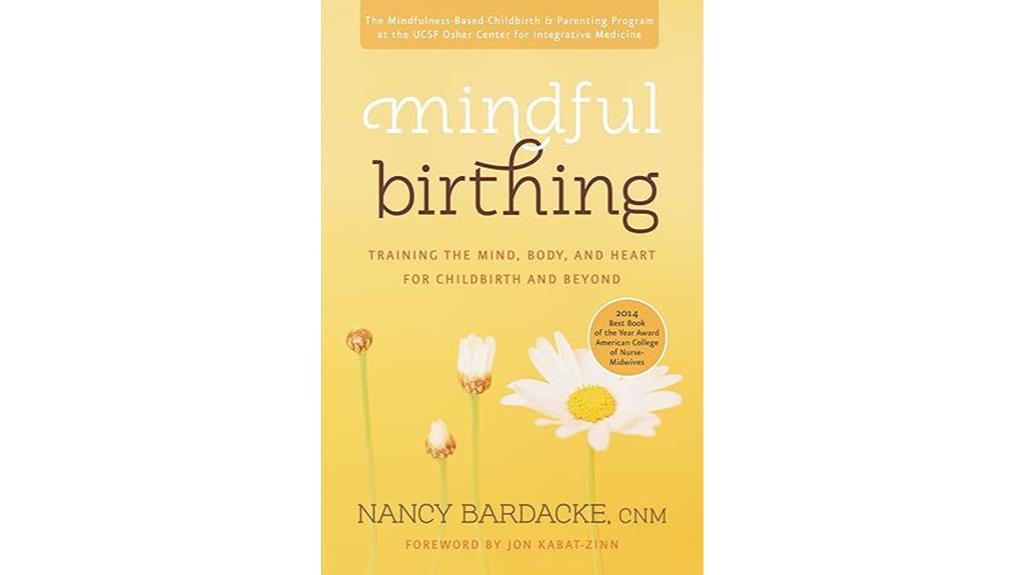
Ideal for expecting parents seeking a holistic approach to childbirth and mindfulness techniques, 'Mindful Birthing' provides valuable tools for managing the birthing experience and beyond. This book has been praised for easing worries surrounding childbirth and offering practical strategies for labor and delivery.
Readers appreciated the non-judgmental approach and found the mindfulness techniques instrumental in staying calm and composed during birth. 'Mindful Birthing' comes highly recommended for expecting mothers and their partners, with many highlighting its effectiveness for various types of births, including medication-free deliveries and VBACs.
Additionally, the book includes guidance on postpartum mindfulness, aiding readers in staying present and managing stress during the initial months of parenting. With positive feedback on its impact on birth experiences, 'Mindful Birthing' is a valuable resource for those seeking a mindful approach to childbirth and beyond.
Best For: Expecting parents looking for a comprehensive guide to mindfulness techniques and holistic approaches to childbirth and parenting.
Pros:
- Offers practical tools and strategies for managing the birthing experience.
- Non-judgmental approach appreciated by readers with different birth experiences.
- Includes guidance on postpartum mindfulness to assist in staying present and reducing stress during early parenting.
Cons:
- Some readers may find the mindfulness techniques challenging to implement consistently.
- May not cater to individuals who prefer a more traditional, medical-focused approach to childbirth.
- Limited focus on specific medical interventions or complications that may arise during childbirth.
Mindful Parenting for ADHD Children
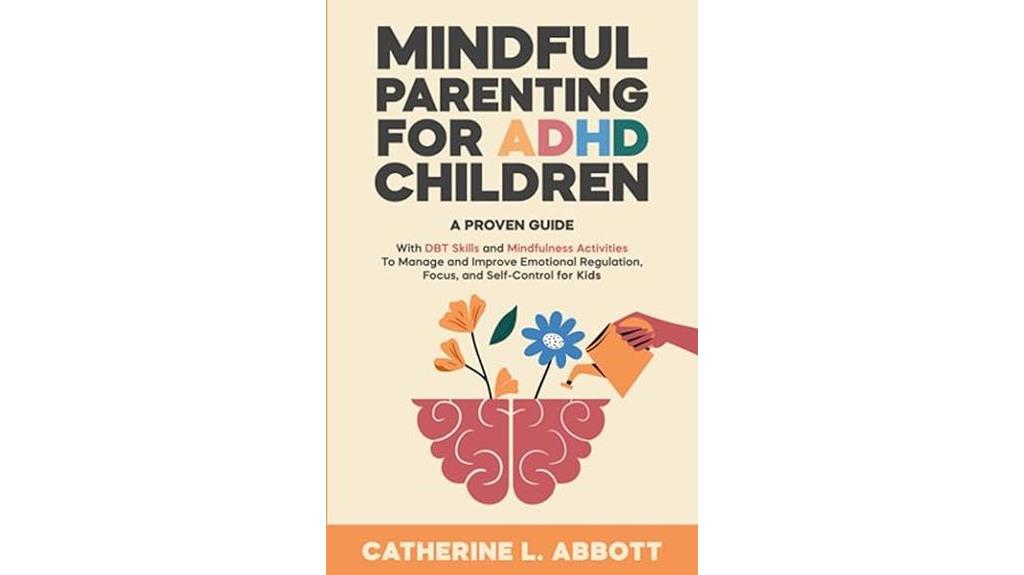
Ideal for parents seeking practical strategies to support children with ADHD, Mindful Parenting Books offer valuable insights and coping mechanisms. These books provide a holistic understanding of ADHD, covering symptoms, causes, and diagnosis. They equip parents with practical tools such as DBT skills and mindfulness activities to help children manage emotional regulation, focus, and self-control effectively.
Readers recommend these books not only for parents but also for foster parents, teachers, and individuals working with children dealing with ADHD. Personal experiences shared by readers highlight how these books have helped them navigate the challenges of raising children with ADHD, offering practical strategies and valuable coping mechanisms.
By promoting self-awareness, self-control, effective communication, and nurturing environments, Mindful Parenting Books play a significant role in fostering harmonious relationships between parents and children with ADHD.
Best For: Parents, foster parents, teachers, and individuals working with children with ADHD seeking practical tools and insights to support emotional regulation and self-control.
Pros:
- Comprehensive understanding of ADHD, including symptoms, causes, and diagnosis.
- Practical tools like DBT skills and mindfulness activities for managing emotional regulation and focus in children with ADHD.
- Empowers parents to create a nurturing environment fostering self-awareness and self-control in children with ADHD.
Cons:
- Subjective nature of content may not resonate with all readers.
- Similar strategies may be available online for free, raising concerns about the book's unique value.
- Some readers may find the content repetitive or lacking in depth in certain areas.
Mindful Parenting Book
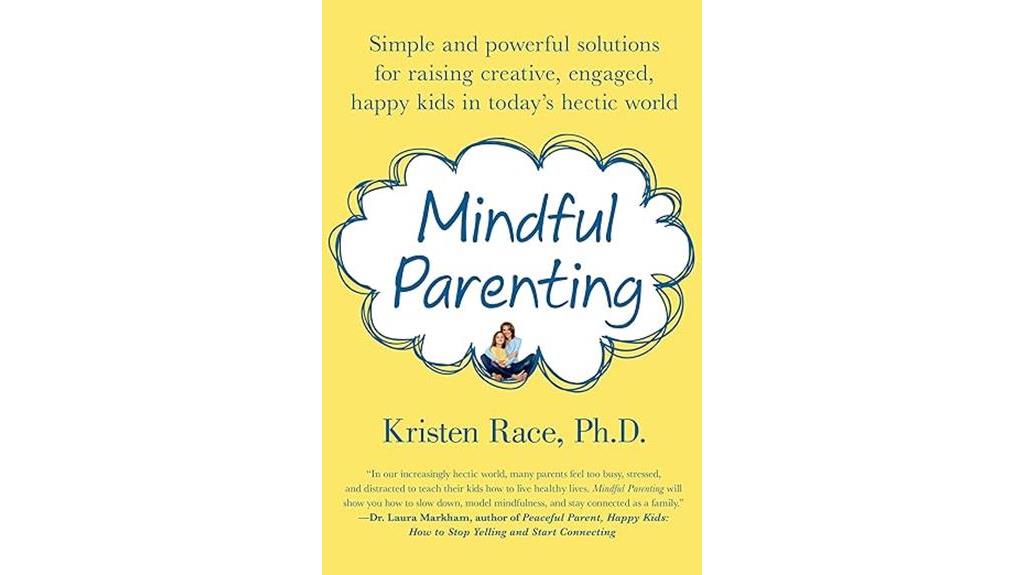
For parents seeking practical and science-backed strategies to explore mindfulness in their parenting approach, this book offers valuable insights and actionable advice. With numerous positive reviews praising its eye-opening content and practicality, this book seems to resonate with a wide range of readers.
It not only delves into understanding why children react the way they do but also provides tips for managing stress and improving mindfulness. Backed by scientific evidence, each chapter offers a blend of research-based information and mindfulness techniques, making it accessible even to those unfamiliar with complex biological concepts.
The book's practical suggestions and easy application have garnered recommendations from various readers, highlighting its global relevance beyond just American audiences. Whether you're a parent, grandparent, or anyone working with children, this book seems to offer a detailed guide to incorporating mindfulness into your parenting journey.
Best For: Parents and caregivers looking for practical, science-backed strategies to integrate mindfulness into their parenting approach.
Pros:
- Offers valuable insights and actionable advice for understanding children's behavior and managing stress.
- Backed by scientific evidence, providing a blend of research-based information and mindfulness techniques.
- Practical suggestions and easy application make it accessible to a wide range of readers, including those unfamiliar with complex biological concepts.
Cons:
- May not delve deep enough into certain advanced parenting topics.
- Could benefit from more diverse perspectives and cultural considerations.
- Some readers may find the content repetitive or overly simplistic.
Mindful Discipline: A Loving Approach to Setting Limits and Raising an Emotionally Intelligent Child
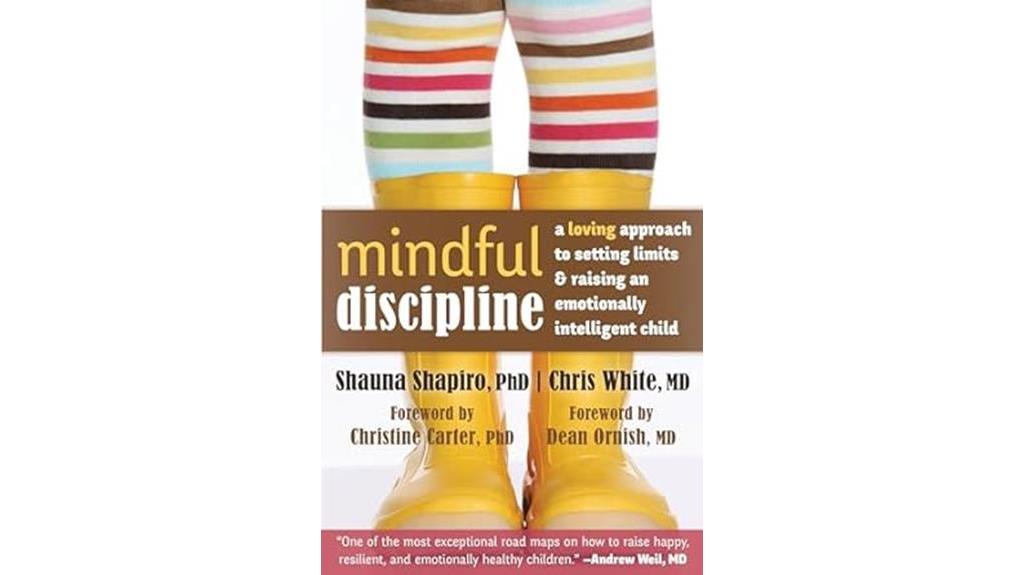
Best suited for parents seeking to incorporate mindfulness and loving discipline in their parenting approach, 'Mindful Discipline: A Loving Approach to Setting Limits and Raising an Emotionally Intelligent Child' offers practical strategies and insights for nurturing emotionally intelligent children. The book is praised for its common-sense approach, providing readers with tangible examples to follow.
By emphasizing mindfulness and balanced discipline, it equips parents with tools to raise children who are emotionally adept. Mindfulness benefits highlighted in the book include improved emotional regulation and resilience for both parents and children.
Readers appreciate the easy-to-implement strategies for setting boundaries and fostering a harmonious home environment. Though some desire more hands-on tips, the academic foundation of the book ensures a well-balanced and science-based approach to mindful parenting.
Best For: Parents looking to incorporate mindfulness and loving discipline in their parenting approach to raise emotionally intelligent children.
Pros:
- Practical strategies and tangible examples provided for nurturing emotionally intelligent children.
- Emphasis on mindfulness and balanced discipline to equip parents with effective tools.
- Easy-to-implement strategies for setting boundaries and fostering a harmonious home environment.
Cons:
- Some readers desire more hands-on tips and examples.
- Need for alternative strategies if initial suggestions do not work smoothly.
- Lack of practical advice and examples may leave some readers feeling the book falls short of expectations.
Parenting from the Inside Out: How a Deeper Self-Understanding Can Help You Raise Children Who Thrive

With its focus on deeper self-understanding to enhance parenting skills, 'Parenting from the Inside Out' is a valuable resource for those seeking to cultivate a strong and nurturing relationship with their children.
This book explores the importance of understanding one's own past and emotions to become a better parent. By investigating how our upbringing influences our parenting style, 'Parenting from the Inside Out' offers a fresh perspective on raising children.
It emphasizes the significance of healing past wounds and developing a deeper self-awareness to create a more empathetic and understanding environment for our children to thrive.
Through personal insights from professionals and scientific references, this book provides practical tools for self-growth and fostering stronger parent-child relationships.
If you're looking to enhance your parenting skills through inner reflection and understanding, 'Parenting from the Inside Out' is a must-read.
Best For: Individuals seeking to improve their parenting skills through deeper self-understanding and healing past wounds.
Pros:
- Offers valuable insights on how personal history influences parenting style.
- Provides practical tools and exercises for self-growth and fostering better parent-child relationships.
- Backed by personal insights from professionals and referenced scientific material for a comprehensive understanding.
Cons:
- May require a significant amount of introspection and emotional work.
- Some readers might find the psychological concepts challenging to grasp initially.
- Not a quick-fix solution and requires ongoing commitment to personal growth and reflection.
Under the Chinaberry Tree: Books and Inspirations for Mindful Parenting

When considering books for mindful parenting, exploring 'Under the Chinaberry Tree' can provide valuable insights and inspirations for traversing the journey of raising young children. This book has garnered positive reviews for its comforting and valuable content, appreciated by fans of Chinaberry's offerings.
Ann's wisdom and humor shine through, making it a recommended read for all parents of young children. Despite some critiques about its focus on specific age groups and design elements, the book's teachings on parenting from the heart and soul have left a lasting impact on readers.
Through personal growth and a unique perspective, 'Under the Chinaberry Tree' has influenced many to become better parents. Sharing personal experiences and recommendations, this book serves as a guiding light for mindful parenting.
Best For: Parents seeking valuable insights and inspirations for mindful parenting to navigate the journey of raising young children.
Pros:
- Offers comforting and valuable content appreciated by fans of Chinaberry's offerings.
- Provides teachings on parenting from the heart and soul, impacting personal growth and perspective.
- Recommended read for all parents of young children, influencing better parenting skills.
Cons:
- Critiques regarding the focus on specific age groups in the book.
- Some children may not find recommended books appealing.
- Design elements such as detailed illustrations and the green typeface may impact engagement and readability.
Growing Up Mindful
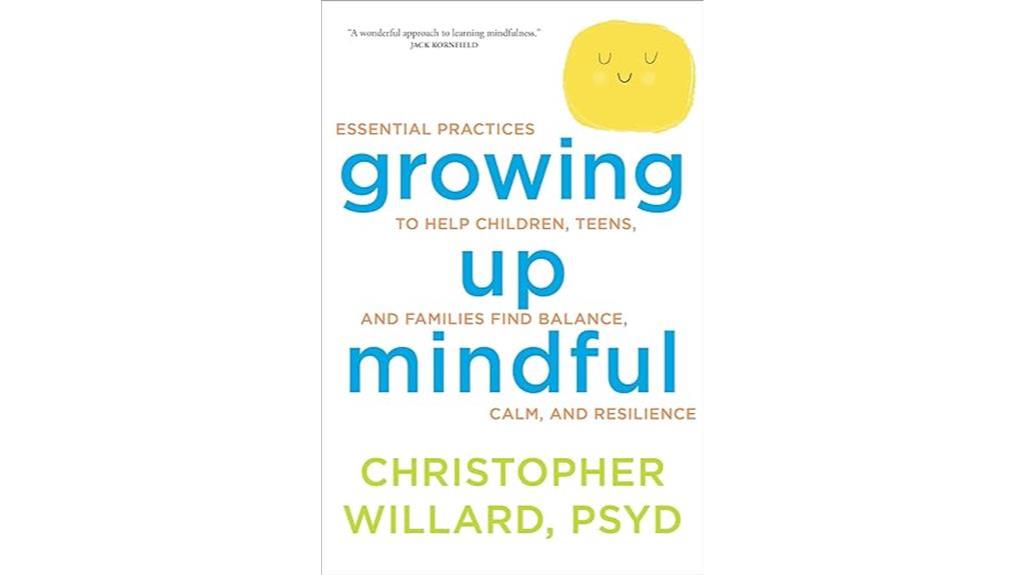
For parents, teachers, therapists, caregivers, or anyone interested in sharing mindfulness with children, 'Growing Up Mindful' offers easily implemented practices and a positive outlook on teaching mindfulness to kids. This book provides a variety of practical suggestions that are clear, easy to follow, and suitable for individuals at all experience levels.
It includes a helpful chart showcasing the positive impact of regular mindfulness practice, making it a valuable resource for those looking to introduce mindfulness into children's lives. With a writing style that's genuine and easy to understand, 'Growing Up Mindful' incorporates mindful interludes for experiential learning, enhancing the overall reading experience.
Users have praised this book as one of the best resources for teaching mindfulness to children, making it a must-have for anyone interested in incorporating mindfulness practices into their families or classrooms.
Best For: Parents, educators, therapists, and caregivers seeking a comprehensive and user-friendly guide for teaching mindfulness to children.
Pros:
- Easily implemented practices suitable for beginners and experienced individuals.
- Genuine writing style with mindful interludes for experiential learning.
- Positive impact chart showcasing the benefits of regular mindfulness practice.
Cons:
- Some users reported receiving books with stains upon arrival.
- One user recommended purchasing the physical copy over the digital version.
- Limited mention of potential challenges or obstacles in implementing mindfulness practices with children.
Practicing Mindfulness: 75 Essential Meditations to Reduce Stress, Improve Mental Health, and Find Peace

Ideal for busy parents seeking quick and effective mindfulness practices, 'Practicing Mindfulness: 75 Essential Meditations to Reduce Stress, Improve Mental Health, and Find Peace' offers accessible techniques tailored for daily use. This book by Mathew Sockolov presents a wide range of meditation approaches designed to fit into even the busiest schedules, with sessions lasting between 5 to 20 minutes.
It covers areas such as basic mindfulness exercises, everyday mindfulness, and mindful moods, making it a thorough guide for self-improvement through meditation. Readers have praised its simplicity, readability, and practicality in incorporating meditation into their daily routines.
Whether you're new to mindfulness or a seasoned practitioner, this book provides valuable resources for managing emotions and stress effectively in everyday life.
Best For: Individuals with busy schedules seeking accessible and effective mindfulness practices.
Pros:
- Offers a wide range of meditation approaches suitable for daily use.
- Simple and practical exercises that take little time to complete.
- Comprehensive guide covering various areas for self-improvement through meditation.
Cons:
- Some may find the meditation ideas presented overly simplistic.
- Content may not be deemed substantial enough for certain preferences.
- A perception of the material being more suitable for a blog post or series rather than a book.
The Book of Joy: Lasting Happiness in a Changing World

Exploring 'The Book of Joy: Lasting Happiness in a Changing World' offers valuable insights for parents seeking to cultivate compassion and empathy in their parenting journey. Published in 2016, this book documents a remarkable week-long meeting between the Dalai Lama and Archbishop Desmond Tutu, focusing on the pursuit of joy amidst life's challenges.
Divided into three parts, it covers the essence of true joy, the barriers to joy, and the pillars of joy. Delving into topics like suffering, forgiveness, and compassion, the book provides practical advice on finding happiness and maintaining mental well-being.
Readers appreciate the wisdom, humor, and depth of humanity portrayed in this book, making it a recommended read for those looking to enhance their personal growth and embrace joy in an ever-changing world.
Best For: Parents seeking to instill compassion and empathy in their parenting journey through profound insights on joy and resilience.
Pros:
- Offers practical advice on finding happiness and maintaining mental well-being.
- Delightful blend of wisdom, humor, and humanity.
- Insightful exploration of joy amidst life's challenges.
Cons:
- May require reflection and introspection, which can be time-consuming.
- Some readers may find the content emotionally intense.
- Not a quick-fix solution for immediate happiness.
Beginners Guide on Parenting Children with ADHD: Modern Approach to Understanding and Leading Hyperactive Child to Success
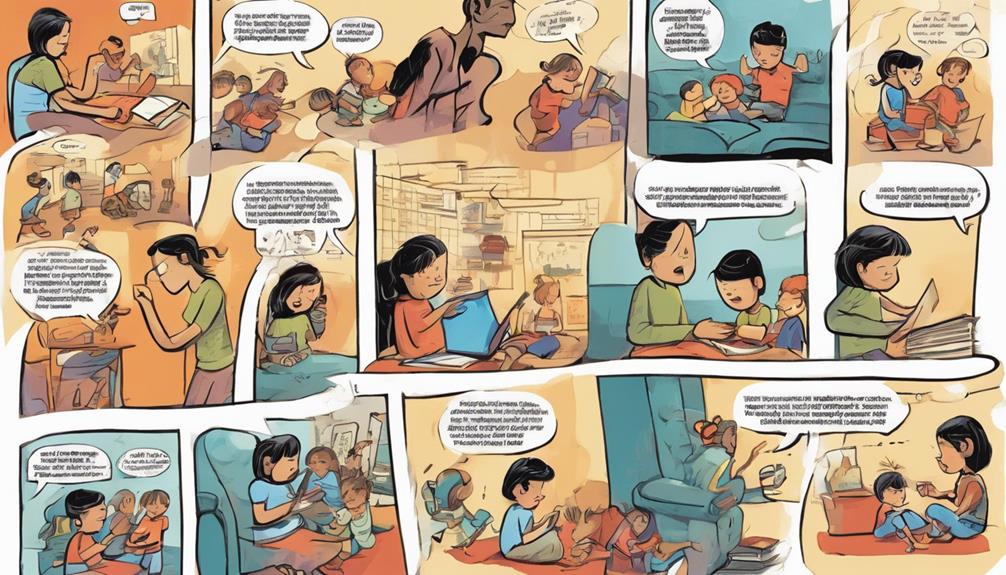
When seeking a practical and insightful guide on parenting children with ADHD, 'Mindful Parenting Books' stands out as a valuable resource. This book has garnered positive reviews for its helpful content and modern approach to dealing with ADHD.
While it may lack concrete suggestions on how to help kids with ADHD according to some critics, it's still praised for its clear and concise style, making it great for beginners. Some readers appreciate the perspective offered by the knowledgeable author, although a few feel it could benefit from more practical advice.
Overall, the book emphasizes the importance of wise parenting in guiding ADHD children and incorporates successful therapy methods that have been well-received. Published in 2021, it provides up-to-date information compared to older resources.
Best For: Parents seeking a modern and beginner-friendly approach to understanding and guiding children with ADHD.
Pros:
- Provides valuable content and a modern approach to dealing with ADHD.
- Clear and concise, great for beginners.
- Emphasizes the importance of wise parenting in guiding ADHD children.
Cons:
- Lacks concrete suggestions on how to help kids with ADHD.
- Some find it upsetting to refer to ADHD as an illness.
- Needs more practical advice on what to do instead of what not to do.
Being at Your Best When Your Kids Are at Their Worst: Practical Compassion in Parenting
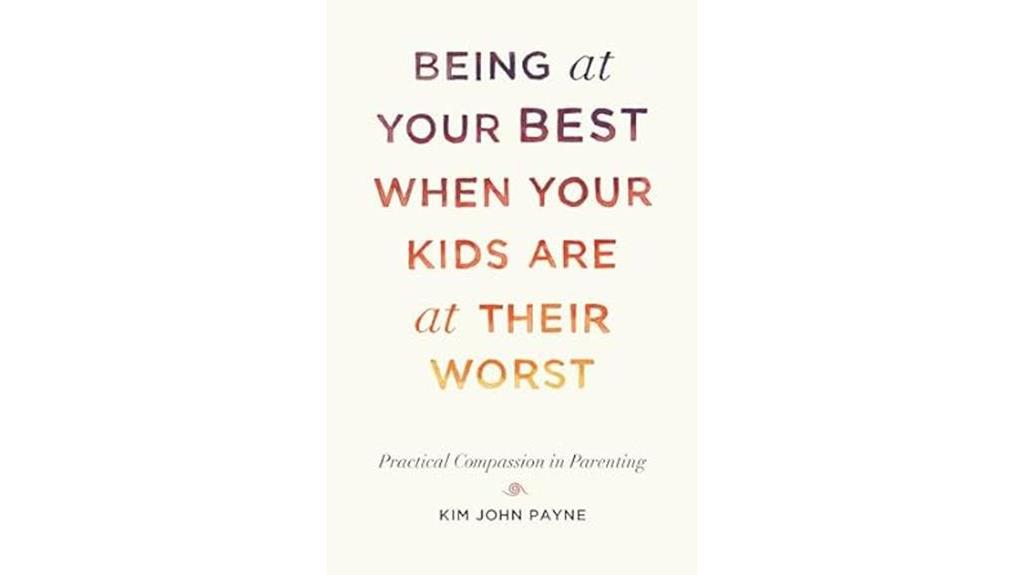
For parents seeking practical guidance on maintaining composure and showing compassion during challenging parenting moments, 'Being at Your Best When Your Kids Are at Their Worst: Practical Compassion in Parenting' stands out as a valuable resource. This book has garnered positive reviews and recommendations for its practical advice and approachable writing style. Readers appreciate the concise and helpful nature of the content, along with the author's use of personal experiences in education.
Despite these strengths, some concerns have been raised regarding the book's applicability to children with attachment issues like Reactive Attachment Disorder. Additionally, a few readers feel that the parenting approaches presented may oversimplify complex behavioral challenges.
However, the book's focus on compassion and empowering parenting techniques remains a highlight, with many sharing how it has helped improve their relationships with their children and reduce conflicts within the family.
Best For: Parents looking for practical and compassionate parenting guidance during challenging moments with their children.
Pros:
- Practical advice and approachable writing style.
- Concise and helpful content with practical tools for parenting.
- Focus on compassion and empowering parenting techniques.
Cons:
- Lack of accommodation for children with attachment issues like Reactive Attachment Disorder.
- Oversimplification of parenting approaches may not suit children with deep behavioral challenges.
- Heavy use of metaphors and catchphrases in the book.
Parenting at Your Best: Powerful Reflections and Straightforward Tips for Becoming a Mindful Parent
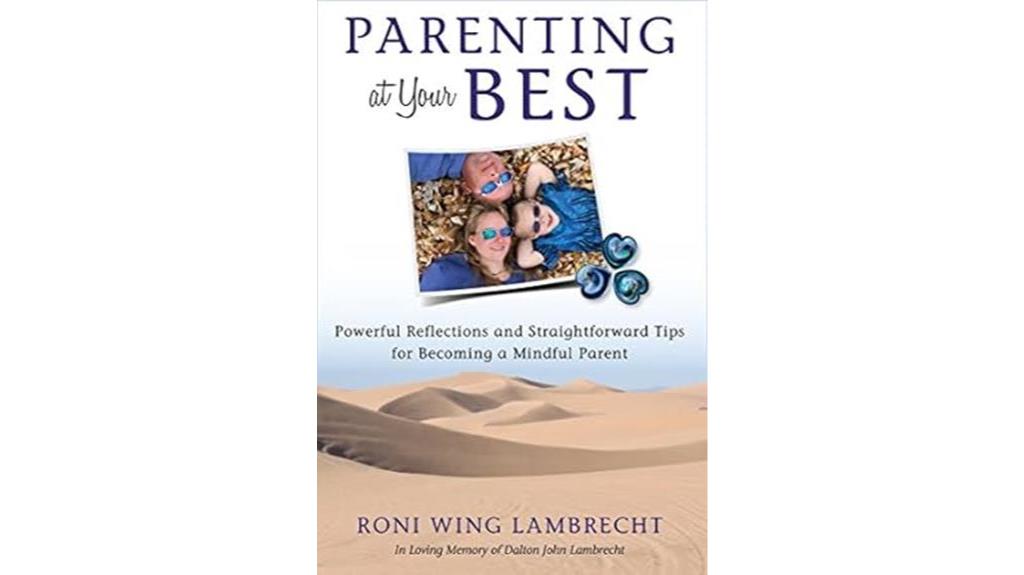
This book, Parenting at Your Best, is a valuable resource for new and soon-to-be parents as well as those who've experienced loss, offering powerful reflections and practical tips for mindful parenting.
Written by Roni Wing Lambrecht, the book draws from the author's personal journey through grief after losing her teenage son, Dalton. It emphasizes the importance of intentional parenting and treasuring moments with our children.
The book focuses on making each parenting moment meaningful, highlighting the significance of respect in parent-child relationships. It provides straightforward and down-to-earth advice, promoting inclusivity and open communication within families.
Readers have found the book to evoke a range of emotions, from smiles to tears, while offering practical and heartfelt guidance for reflecting on parenting approaches.
Overall, Parenting at Your Best is praised for its sincerity, practicality, and ability to resonate with parents looking to enhance their parenting skills.
Best For: Parents looking to enhance their parenting skills and embrace mindful parenting practices.
Pros:
- Offers powerful reflections and practical tips for mindful parenting.
- Written by an author who shares personal experiences and wisdom.
- Emphasizes the value of respect in parent-child relationships.
Cons:
- May evoke strong emotional responses in readers, including tears.
- Focuses on grief and loss, which may be challenging for some readers.
- Some readers may find the approach too sentimental or emotional.
The Mindful Parent

Exploring 'The Mindful Parent' offers valuable insights and practical strategies for parents seeking to cultivate stronger parent-child relationships through mindfulness. This book emphasizes the importance of shifting one's mindset to enhance the dynamics with their children.
It provides actionable tips on incorporating mindfulness into parenting practices to foster better connections and personal development. Despite a few typographical errors, readers have generally appreciated the informative and concise nature of the book.
Readers commend it as essential reading for all parents, praising its ability to offer guidance and help them embrace their parental responsibilities. While some readers have noted the need for better editing and felt the book leaned too heavily on promoting mindful parenting, overall, it's recommended for those looking to enrich their parenting journey with mindfulness principles.
Best For: Parents looking to deepen their bond with their children through mindful practices.
Pros:
- Offers practical tips for applying mindfulness to parenting.
- Emphasizes the importance of changing one's mindset for better parent-child relationships.
- Provides insightful information for personal growth and enhancing parenting skills.
Cons:
- Contains typographical errors that may be distracting.
- Some readers feel it focuses too much on selling the concept of mindful parenting.
- Implementation tips could be more extensive for practical application.
Factors to Consider When Choosing Mindful Parenting Books

When selecting mindful parenting books, it's crucial to take into account key selection criteria such as the author's expertise and the book's reputation.
Assessing the content, reader engagement levels, and practical application tips within the book can help ascertain its usefulness for your parenting journey.
Search for impactful parenting techniques that align with your values and parenting style to make the most of your reading experience.
Key Selection Criteria
Taking into account the author's background and expertise in parenting, mindfulness, or child psychology is vital when selecting mindful parenting books. Authors with experience in these areas are more likely to provide valuable insights and practical advice that can resonate with your parenting journey.
It's essential to look for books that offer practical tips, techniques, and strategies for mindful parenting, as these can be directly applied to your daily interactions with your children. Checking for recommendations or reviews from other parents, educators, or professionals in the field can also give you a better understanding of the book's effectiveness and relevance.
Consider the specific focus of the book, such as ADHD parenting, emotional intelligence, or mindfulness practices, to make sure it aligns with your current needs and challenges. Evaluating the readability and engaging nature of the book is important to make sure that it complements your parenting style and preferences, making the learning process more enjoyable and effective.
Book Content Evaluation
Considering the practicality and relevance of the content is essential when selecting mindful parenting books. It's important to evaluate the depth of insights and wisdom shared by the authors, as well as the presence of personal experiences and relatable anecdotes within the book.
Additionally, looking at how the content aligns with your specific parenting needs and challenges is crucial. Examining the author's background and expertise can provide insight into the basis of their advice, helping you determine the credibility of the information presented.
When evaluating book content, focus on practical tips and strategies offered for implementing mindful parenting, seeking a balance between theory and actionable guidelines. Consider whether the information provided aligns with your parenting goals and values, and if the book addresses common parenting challenges relevant to your family dynamics.
Checking reader feedback can also offer valuable insights into how the book's content has helped others improve their parenting skills and relationships with their children.
Reader Engagement Levels
To choose mindful parenting books effectively, it's important to assess the levels of reader engagement, which play a significant role in the book's impact on implementing mindfulness techniques in parenting.
Engaging content is crucial as it keeps readers interested and motivated to apply the teachings within the book. Interactive elements such as exercises, worksheets, and reflection prompts can enhance engagement by encouraging active participation. Additionally, personal anecdotes and relatable stories can resonate with readers, making the content more relatable and engaging.
Books that offer practical, actionable advice tend to engage readers more effectively in applying mindfulness techniques in parenting situations. Reader engagement levels can be gauged by the emotional responses evoked, such as tears, inspiration, and reflection. Positive feedback from readers praising the book's impact and practical advice is a strong indicator of high engagement levels.
Furthermore, personal experiences shared by readers and recommendations based on practicality and value demonstrate a deep connection and high level of engagement with the book's content.
Practical Application Tips
Practical application tips found in mindful parenting books serve as invaluable resources for parents seeking to implement mindfulness techniques in their day-to-day interactions with their children. These tips offer step-by-step guidance on applying mindfulness practices in various parenting challenges. They provide concrete strategies for enhancing self-awareness, managing emotions, and fostering positive communication with kids. Often, these tips include exercises, reflection prompts, and real-life examples to illustrate effective mindful parenting.
Impactful Parenting Techniques
When choosing mindful parenting books, it's essential to ponder the specific impactful parenting techniques they offer to enhance your relationship with your child.
Effective parenting techniques focus on building strong parent-child relationships and fostering emotional intelligence. Mindful parenting involves practicing self-awareness, empathy, and compassion towards oneself and children.
Techniques such as active listening, setting boundaries with empathy, and modeling positive behaviors are key in mindful parenting. Mindfulness practices like deep breathing, meditation, and self-reflection help parents respond calmly to challenging situations.
These techniques promote emotional regulation, communication skills, and positive behavior modeling for children.
Building strong parent-child relationships based on respect, open communication, and emotional connection is vital.
Being present in the moment, actively listening to your children, setting boundaries with love and consistency, and encouraging self-awareness and emotional regulation are fundamental in mindful parenting.
Positive discipline strategies that prioritize teaching and guiding children are also emphasized.
Frequently Asked Questions
How Can Mindful Parenting Help With Managing ADHD in Children?
Mindful parenting can benefit children with ADHD by fostering increased self-awareness and emotional regulation. By practicing mindfulness techniques, parents can help children manage impulsivity and improve attention span.
Mindful parenting also promotes open communication, patience, and empathy, which are essential in supporting children with ADHD. Setting clear boundaries and consistent routines in a mindful manner can create a stable environment that aids in managing ADHD symptoms effectively.
What Are the Key Differences Between Mindful Discipline and Traditional Discipline?
Mindful discipline emphasizes understanding a child's emotions and encourages positive behavior through communication. Traditional discipline often focuses on punishment and obedience.
By fostering empathy and connection, mindful discipline builds a child's self-regulation skills and strengthens the parent-child bond. In contrast, traditional discipline may lead to power struggles and resentment.
Incorporating mindfulness techniques, such as deep breathing and active listening, can enhance the effectiveness of discipline strategies and promote a harmonious parent-child relationship.
How Can Mindfulness Practices Benefit Parents During Childbirth and Beyond?
Mindfulness practices offer parents invaluable tools during childbirth and beyond. By cultivating present moment awareness and non-judgmental acceptance, parents can navigate the challenges of labor with greater calm and focus.
Post-birth, mindfulness aids in managing stress, enhancing bonding with the newborn, and fostering emotional resilience. This practice enables parents to respond to their child's needs mindfully, promoting healthy relationships and effective communication.
Ultimately, mindfulness supports parental well-being and nurtures a harmonious family dynamic.
Are There Specific Mindfulness Techniques Tailored for Raising Emotionally Intelligent Children?
Mindfulness techniques can be adapted to nurture emotionally intelligent children. Practices like active listening, empathy modeling, and teaching emotional regulation skills are key.
Mindful breathing exercises can help kids manage big emotions. Setting a calm environment and encouraging open communication foster emotional intelligence.
How Do Mindful Parenting Books Contribute to Self-Understanding and Improved Parent-Child Relationships?
Mindful parenting books serve as guiding lights, illuminating the path to self-discovery and deeper parent-child connections. By delving into these insightful texts, one can uncover hidden aspects of themselves and understand how their actions influence relationships.
These resources offer practical tools and perspectives that foster empathy, communication, and mutual respect within families. Through self-reflection and newfound knowledge, parents can cultivate stronger bonds with their children, nurturing understanding and harmony in their interactions.
Are the Books in the Mindful Parenting List Still Relevant and Worth Reading in 2024?
Looking for the best parenting books in 2024? The books in the Mindful Parenting list are still relevant and worth reading. With timeless advice on raising children in the digital age, fostering empathy, and maintaining a balanced family life, these books remain essential for parents navigating the challenges of modern parenting.
Conclusion
As parents, we're like gardeners nurturing our children, planting seeds of mindfulness and compassion. By reading the best mindful parenting books, we equip ourselves with the tools to cultivate a peaceful and harmonious environment for our families to thrive.
Just as a well-tended garden flourishes with care and attention, so too can our children bloom into resilient and compassionate individuals with the guidance provided by these insightful books.
Vetted
14 Best French Parenting Books Every Parent Should Read for Better Parenting
Wondering how French parenting can transform your approach? Explore these 14 essential books for invaluable insights and elevate your parenting game!

Here’s a stack of well-known French parenting books that can step up your parent game. **Bringing Up Bébé** and **French Kids Eat Everything** offer secrets on setting rules, encouraging independence, and getting kids to eat healthily. Books such as **French Parents Don’t Give In** and **French Twist** provide fantastic tips for raising kids. These books guide you in teaching patience, resilience, and good behavior. They highlight a balanced parenting style inspired by French insights. Curious to see how these books can transform your parenting journey? Jump in and find out!
Key Takeaways
- Explore French parenting methods for setting boundaries and fostering independence.
- Discover practical tips for discipline, routines, and child-rearing philosophies.
- Compare French techniques with American parenting styles for diverse insights.
- Implement actionable advice on manners, healthy habits, and sibling conflicts.
- Enhance parenting skills with strategies for instilling responsibility and self-control.
Bringing Up Bébé: One American Mother Discovers the Wisdom of French Parenting
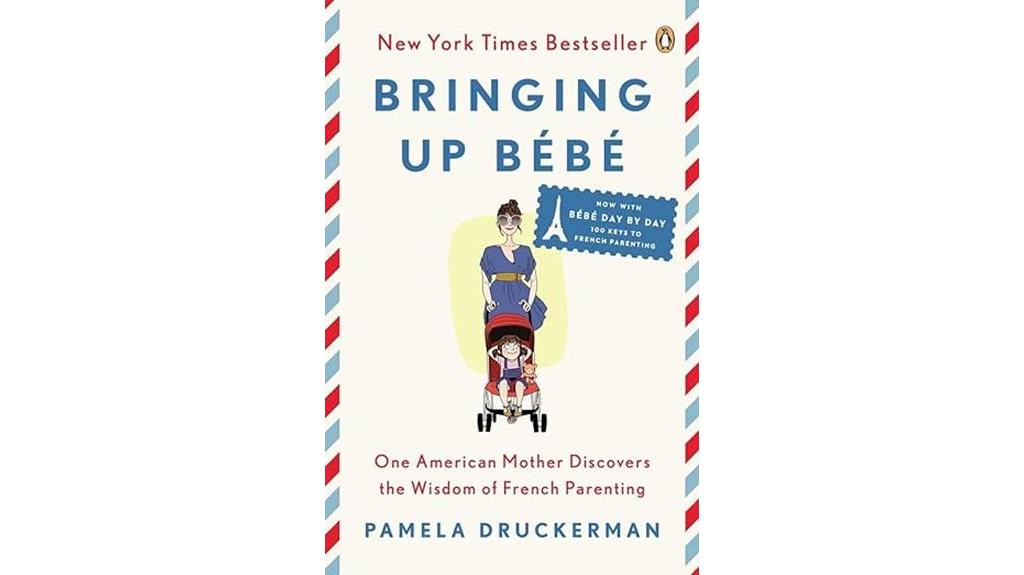
For those seeking a fresh perspective on parenting methods, 'Bringing Up Bébé' offers valuable insights into the wisdom of French parenting practices. This book, written by Pamela Druckerman, explores the contrast between French and American parenting approaches, highlighting the benefits of the former in fostering well-behaved children and confident mothers.
French parenting focuses on setting boundaries, promoting independence in children, and instilling patience and resilience from a young age. The emphasis on adult time in the evenings and teaching children to self-soothe for better sleep are practices that stand out.
Additionally, the French approach to food education, manners, and making mealtime enjoyable is enlightening. 'Bringing Up Bébé' provides practical strategies that can be applied in daily parenting routines, making it a valuable read for those interested in exploring different cultural parenting perspectives.
Best For: Parents looking to explore alternative parenting methods and gain insights into fostering well-behaved children and building confidence in themselves.
Pros:
- Offers a fresh perspective on parenting by contrasting French and American approaches.
- Provides practical strategies that can be applied in daily parenting routines.
- Emphasizes setting boundaries, promoting independence, and instilling patience and resilience in children.
Cons:
- May generalize parenting methods, leading to criticism from those with diverse parenting styles.
- Sparks debate and differing opinions among readers due to the comparison between French and American parenting styles.
- Some may find the emphasis on discipline and routine in French parenting methods too rigid for their liking.
French Kids Eat Everything: Raising Happy, Healthy Eaters
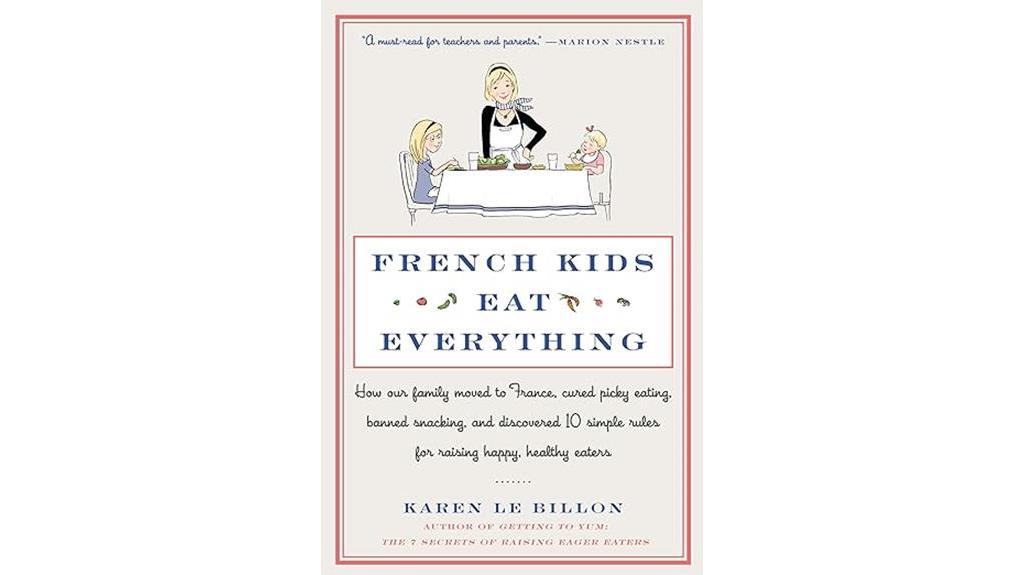
The 'French Kids Eat Everything' book offers practical strategies for fostering healthy eating habits in children and transforming family mealtimes into enjoyable experiences. Implementing the French eating habits outlined in the book has had a significant impact on my family's lifestyle.
By incorporating the concept of a four-course meal and encouraging my children to try new foods, I've witnessed positive changes in their eating behaviors. They now prefer healthier options and have learned to eat until satisfied, not overly full.
Embracing these principles hasn't only improved our food choices but also promoted better health and nutrition. Long-term effects include weight management, enhanced eating habits, and a positive shift in my child's food preferences.
I recommend exploring the French eating approach for a healthier, happier family life.
Best For: Families looking to improve their children's eating habits and transform mealtime experiences into enjoyable and healthier ones.
Pros:
- Practical strategies for fostering healthy eating habits in children.
- Positive impact on children's food preferences and eating behaviors.
- Promotes better health and nutrition through gradual changes in food choices.
Cons:
- Requires consistent effort and commitment to implement the French eating habits.
- Some children may initially resist trying new foods or adapting to the four-course meal concept.
- May be challenging to maintain the principles in busy or hectic family schedules.
French Parents Don't Give In: 100 Parenting Tips From Paris
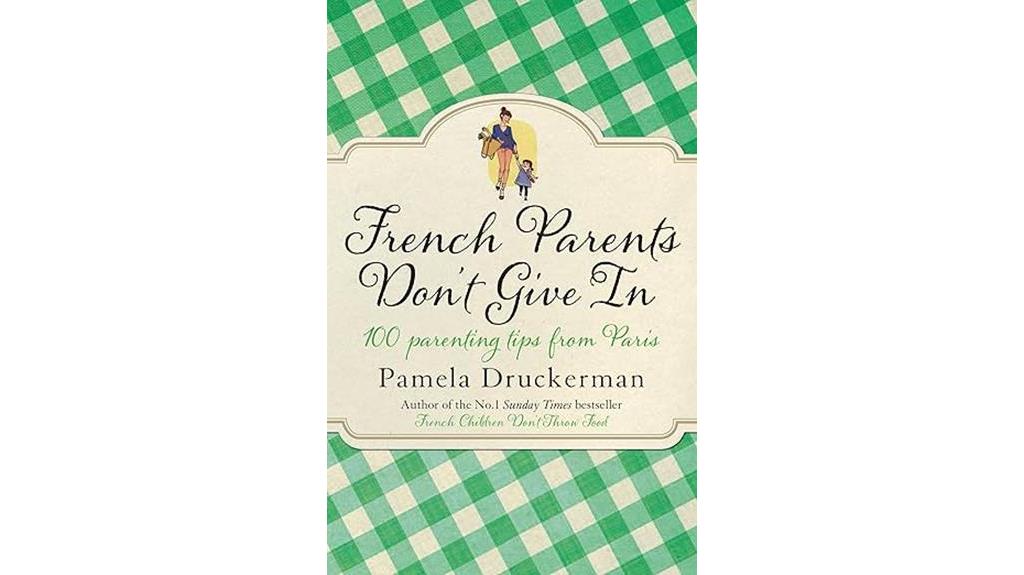
'French Parents Don't Give In: 100 Parenting Tips From Paris' offers practical advice and cultural insights that resonate with parents seeking a balanced and respectful approach to raising children. The book emphasizes the importance of consistency, respect, personal space, sociability, and encouragement in parenting. It acknowledges that children aren't always perfect but advocates for showing love and communicating this to them.
The book is praised for its entertaining and enlightening content, with tips presented in easily digestible paragraphs. It's particularly recommended for busy parents, as it allows for quick reading sessions. Readers appreciate the opportunity to compare parenting styles and customize the tips to suit their own households.
Overall, 'French Parents Don't Give In' provides a sensible and educational approach to child-rearing, offering valuable insights into French culture.
Best For: Parents seeking a practical and respectful approach to raising children with cultural insights.
Pros:
- Entertaining and enlightening content.
- Easily digestible tips in summary paragraphs.
- Valuable insights into French culture.
Cons:
- Higher price for Kindle edition.
- Limited recipes included.
- May not offer radically new parenting strategies.
French Twist: An American Moms Experiment in Parisian Parenting
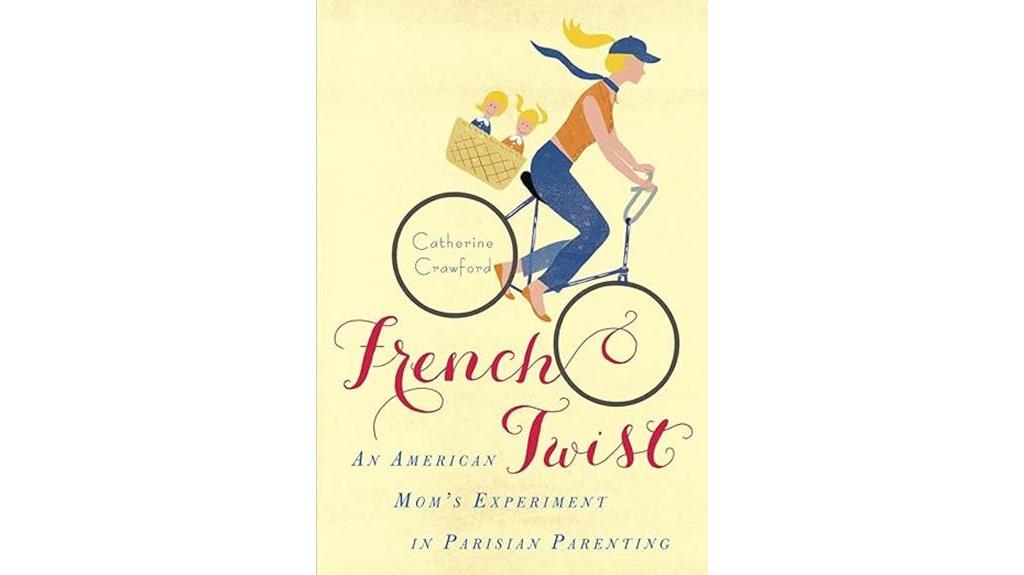
Ideal for parents seeking a balanced approach, 'French Twist: An American Moms Experiment in Parisian Parenting' offers practical insights into blending French and American parenting styles. The book has garnered positive reviews for its practical tips and lessons based on the author's experiences.
It stands out for addressing the 'HOW' element often missing in other parenting books, providing valuable guidance for parents looking to incorporate French techniques into their American parenting style. By contrasting French emphasis on respect, good manners, and discipline with American tendencies towards overindulgence and lack of boundaries, the book prompts readers to ponder the benefits of integrating French methods.
From instilling values like appreciation for good food and manners to dealing with societal expectations and setting boundaries, 'French Twist' equips parents with tools for maneuvering the challenges of raising well-rounded children.
Best For: Parents looking to incorporate French parenting techniques into their American parenting style for a more disciplined and respectful approach.
Pros:
- Practical insights and tips based on the author's experiences.
- Contrasts between French and American parenting styles for a well-rounded perspective.
- Emphasis on instilling values like appreciation for good food and manners.
Cons:
- May not fully address the individuality of each child's needs.
- Some readers may find the comparison of French and American parenting styles too generalized.
- Implementing strict boundaries and discipline may be challenging for parents used to a more lenient approach.
FRENCH CHILDREN DON'T THROW (B)
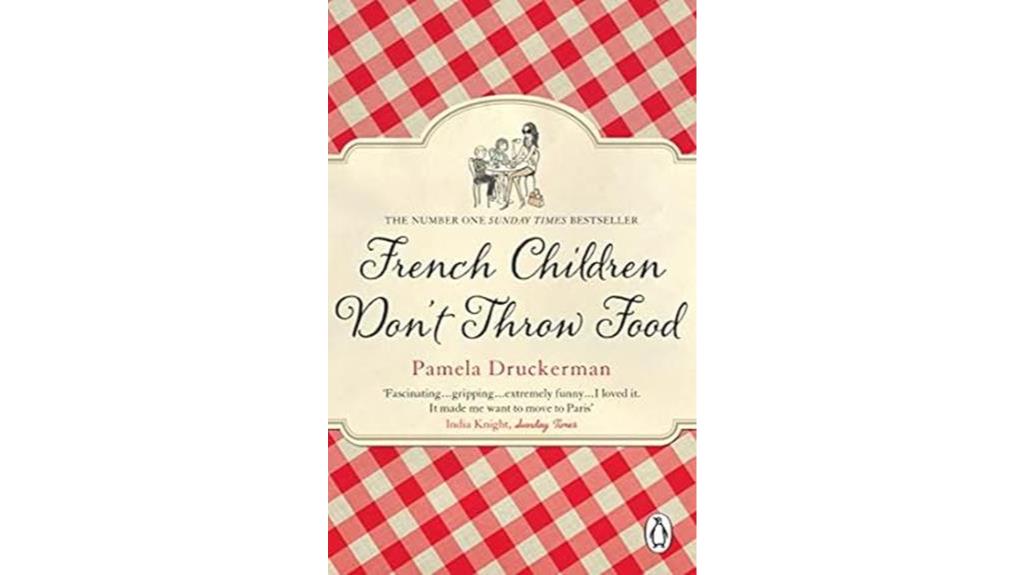
For parents seeking a fresh perspective on raising children, 'French Parenting Books' offers valuable insights into effective parenting techniques and cultural comparisons.
One notable aspect discussed in the book is the idea that French children don't throw tantrums. This concept highlights the emphasis on teaching children self-control and emotional regulation from a young age.
By setting clear boundaries and expectations while also allowing children the space to express themselves, French parenting aims to foster independence and respect.
The book provides practical tips on how parents can implement these strategies in their own parenting style, emphasizing the importance of consistency and patience.
Through personal anecdotes and research-based evidence, readers can gain a better understanding of how this approach can lead to more harmonious family dynamics.
Best For: Parents looking to explore a new parenting philosophy that emphasizes self-control and emotional regulation from a young age.
Pros:
- Offers valuable insights into effective parenting techniques and cultural comparisons.
- Provides practical tips on implementing French parenting strategies.
- Emphasizes fostering independence and respect in children.
Cons:
- May not align with all parenting styles or cultural beliefs.
- Requires consistency and patience to see desired results.
- Some parents may find it challenging to transition to a different parenting approach.
Baby Day by Day: 100 Keys to French Parenting

When seeking a practical and concise guide to French parenting principles, 'Baby Day by Day: 100 Keys to French Parenting' stands out as a valuable resource for new parents or those interested in a laid-back approach. This book offers an appealing and easy-to-read format, condensing essential French parenting concepts into short, shareable tidbits.
It serves as a refresher on the principles outlined in 'Bringing Up Bebe,' making it ideal for parents looking to deepen their understanding of French parenting techniques. 'Baby Day by Day' is often compared to its predecessor, being seen as a more condensed version that provides a quick read and serves as a convenient reference guide.
Readers have reported that this book influences their parenting views, providing confidence, insights, and a fun, informative perspective on applying French parenting principles in real-life situations.
Best For: New parents or individuals interested in a laid-back parenting approach.
Pros:
- Appeals to those seeking a practical and concise guide to French parenting.
- Condenses essential French parenting concepts into easily digestible tidbits.
- Provides insights and confidence for future parenting endeavors.
Cons:
- May be seen as a condensed version of 'Bringing Up Bebe' for readers seeking more in-depth content.
- Some readers may prefer a more detailed exploration of French parenting techniques.
- Limited availability in languages other than English may hinder accessibility for non-English speakers.
Bébé Gourmet: 100 French-Inspired Baby Food Recipes

One standout feature of 'Bébé Gourmet: 100 French-Inspired Baby Food Recipes' is its wide range of nutritious and delicious meal options suitable for parents seeking to raise adventurous eaters. The book offers an extensive selection of recipes ranging from first foods to meals for older eaters, including adults.
With insights from pediatric nutritionist and endocrinologist Dr. Jean Lalau Keraly, the recipes cater to different age milestones, encouraging the introduction of exciting flavors and textures to children. From easy puréed single-fruit meals to more complex combinations, 'Bébé Gourmet' guides parents on how to adapt recipes for older eaters, providing clear instructions and pictures for reference.
This book not only helps in expanding cooking skills but also boosts confidence in feeding children a diverse range of foods, making it a valuable resource for parents looking to introduce their babies to a variety of flavors.
Best For: Parents looking to introduce their babies to a diverse range of nutritious and delicious French-inspired baby food recipes.
Pros:
- Offers a wide range of recipes suitable for different age milestones.
- Provides clear instructions and pictures for easy adaptation and reference.
- Encourages adventurous eating habits in children through exciting flavors and textures.
Cons:
- May require some additional ingredients not commonly found in all households.
- Recipes might be time-consuming for parents with busy schedules.
- Not all children may enjoy the French-inspired flavors and textures.
More than Happy: The Wisdom of Amish Parenting
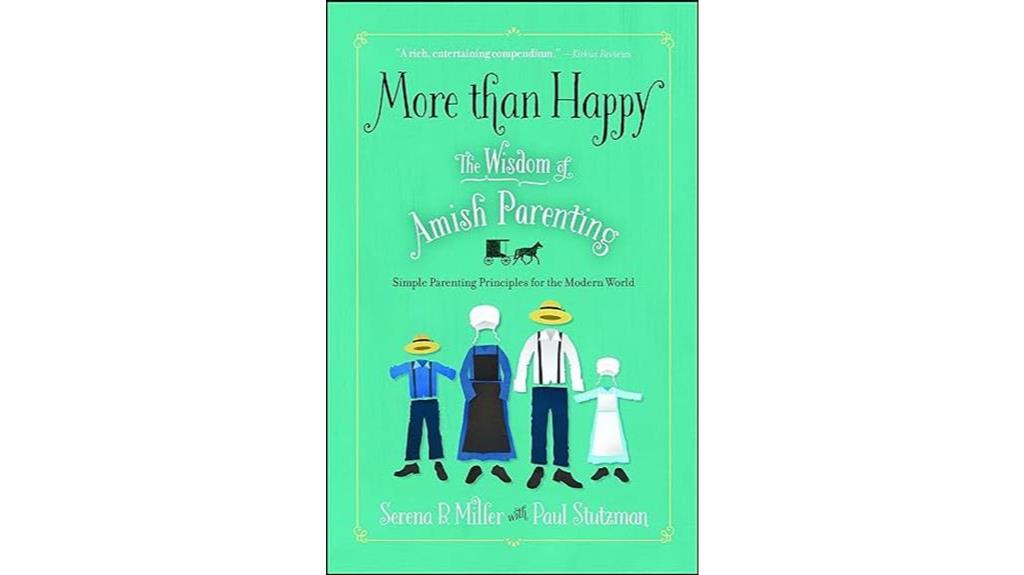
The insights from 'More than Happy: The Wisdom of Amish Parenting' offer a unique perspective on raising children that resonates with those seeking a simpler and values-driven approach in parenting. This book has gained praise for its practical advice and comparisons between Amish and modern parenting styles, emphasizing the importance of instilling values in children.
Readers find the emphasis on faith, family, and generosity as essential elements in child-rearing to be enlightening and invigorating. By delving into the Amish culture and values, the book provides a wealth of information on how traditional practices can be applied to modern family life.
Despite some criticisms regarding occasional repetitions or an excessive focus on personal opinions, 'More than Happy' is widely recommended for its thought-provoking content and valuable insights into raising well-adjusted children.
Best For: Parents looking for a values-driven and insightful approach to raising children that emphasizes faith, family, and generosity.
Pros:
- Practical advice on parenting with valuable insights into Amish culture and values.
- Thought-provoking content that encourages reflection and new ideas in child-rearing.
- Emphasis on instilling character and values in children for a meaningful and fulfilling upbringing.
Cons:
- Occasional repetitions in the content.
- Excessive focus on the authors' personal opinions may overshadow general advice.
- Some readers may find the comparisons between Amish and modern parenting styles limiting or not applicable to their own situations.
How Not to Calm a Child on a Plane: And Other Lessons in Parenting
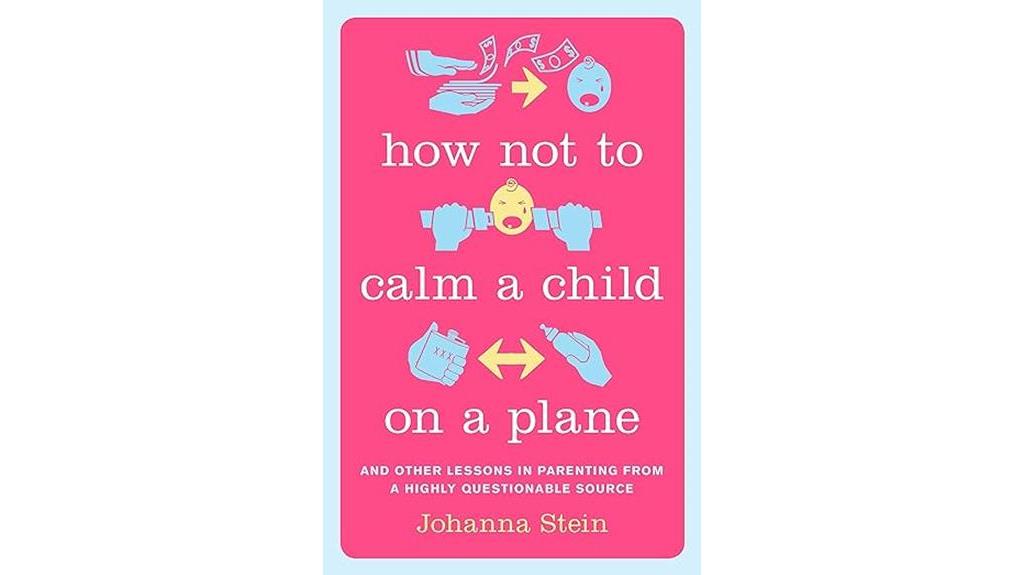
For those seeking a humorous and relatable take on the challenges of parenting, 'How Not to Calm a Child on a Plane: And Other Lessons in Parenting' by Johanna Stein is the perfect choice. Readers have praised Stein's book for its engaging storytelling, humor, and ability to capture the essence of motherhood and parenthood.
The book is described as hilarious, relatable, and a great gift for mothers. Stein's writing style, known for its funny and exaggerated descriptions, has resonated with many, although some find it crass but enjoyable.
Readers appreciate the honesty and humor in Stein's storytelling, feeling connected and not alone in the journey of parenting. Whether you're a parent or not, this book is recommended for its wit, humor, and true-to-life perspectives on the rollercoaster ride of parenthood.
Best For: Parents and non-parents looking for a hilarious and relatable take on the ups and downs of parenthood.
Pros:
- Engaging storytelling filled with humor and wit.
- Captures the essence of motherhood and parenting in a relatable way.
- Offers a perfect gift option for mothers or new parents.
Cons:
- Some readers may find the humor a bit crass.
- The exaggerated descriptions may not appeal to all readers.
- Not suitable for those looking for a serious or instructional parenting book.
French Braid: A novel

When considering French Parenting Books, 'French Braid: A novel' by Anne Tyler offers an engaging exploration of family dynamics and relationships over 60 years. This novel, split into 8 chapters with a large font, spans 342 pages and was first published in 2022, starting in 2010.
Anne Tyler's writing style authentically portrays real-life situations with a focus on families and relationships seen through the characters in the story. Themes of forgiveness, judgment, and the limits of tolerance are woven into the narrative, with characters like Serena, James, Mercy, and Robin showcasing the intricacies of family interactions. The use of the French braid metaphor symbolizes the interconnectedness and nuances of family relationships in Tyler's storytelling.
Readers appreciate the relatable nature and character depth within the novel, praising Tyler's skill in crafting narratives that explore family dynamics and individual growth over time.
Best For: Readers who enjoy character-driven narratives exploring family dynamics and relationships with a focus on subtle storytelling.
Pros:
- Authentic portrayal of real-life situations and family interactions.
- Engaging exploration of themes like forgiveness, judgment, and tolerance.
- Skillful character development and relatable storytelling techniques.
Cons:
- Some concerns about similarities to the author's previous works.
- May not appeal to readers seeking fast-paced plots.
- Limited action scenes or high-drama moments.
Loving the Little Years: Motherhood in the Trenches
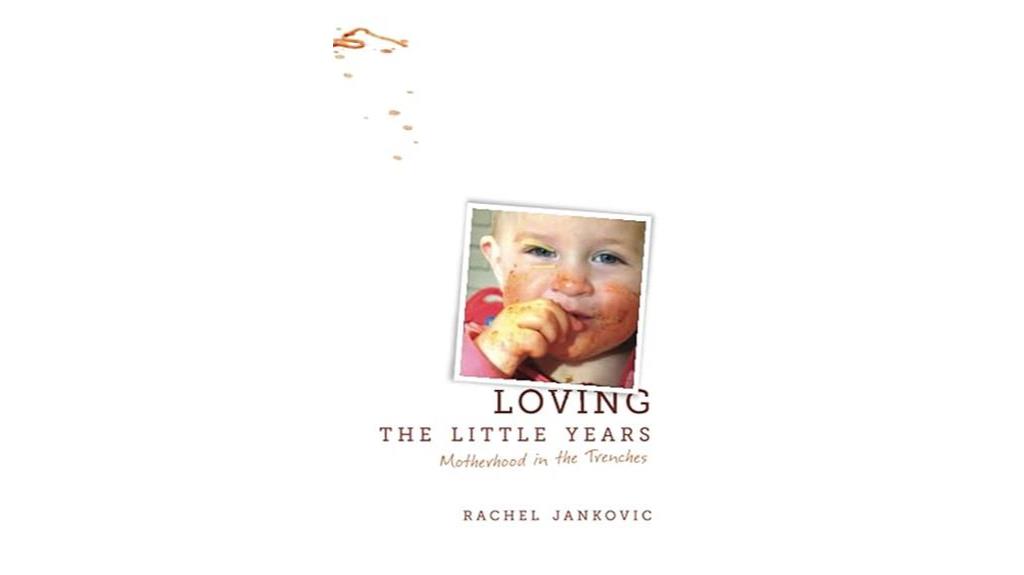
Optimizing my parenting approach with practical and grace-based advice, 'Loving the Little Years: Motherhood in the Trenches' resonates deeply with the challenges and joys of raising young children. Authored by Rachel Jankovic, this book offers a collection of short vignettes that provide counsel and encouragement to Christian parents, especially mothers, journeying through the process of raising children.
Readers, including husbands, fathers, and first-time moms, have praised the book for its practical insights and wisdom tailored for parents of small children. With a focus on grace-based parenting and addressing heart issues rather than mere behavior management, 'Loving the Little Years' encourages parents to embrace motherhood as a high calling.
Through storytelling and practical scenarios, the book equips parents with strategies to manage sibling conflicts, prioritize relationships over possessions, and nurture their children's spiritual growth.
Best For: Parents seeking practical and grace-based advice for navigating the challenges and joys of raising young children.
Pros:
- Offers practical insights and wisdom tailored for parents of small children.
- Emphasizes grace-based parenting and addressing heart issues over behavior management.
- Equips parents with strategies for managing sibling conflicts, prioritizing relationships, and nurturing children's spiritual growth.
Cons:
- May not provide detailed solutions for specific parenting challenges.
- Focus on Christian parenting may not resonate with all readers.
- Short vignettes format may not appeal to those looking for in-depth analysis on parenting topics.
Five French Hens: A warm and uplifting feel-good novel from USA Today Bestseller Judy Leigh

The novel 'Five French Hens' by Judy Leigh offers a heartwarming exploration of life, love, and friendship for readers seeking an uplifting and relatable story. In this feel-good novel, five women in their 70s navigate challenges and discover what truly matters in life.
The characters, including Jen, Tess, Rose, Della, and Pam, come together over aqua fit classes and set out on a journey of self-discovery in Paris. Judy Leigh, a USA Today Bestselling author, skillfully weaves themes of love, friendship, and personal growth into the narrative, creating a compelling and engaging read.
Readers praise the book for its well-developed characters, humor, and poignant life lessons that resonate with women of all ages. 'Five French Hens' is recommended as an entertaining and heartwarming novel that celebrates the joys of friendship and embracing life's adventures.
Best For: Readers looking for a heartwarming and uplifting novel centered around themes of friendship, love, and rediscovery with relatable older protagonists.
Pros:
- Engaging storytelling that resonates with women of all ages.
- Well-developed characters and humor that adds depth to the narrative.
- Poignant life lessons and positive messages about embracing life's adventures.
Cons:
- Some readers may find the storyline predictable.
- Limited focus on certain character backgrounds and experiences.
- The fortune teller element may feel cliché to some readers.
When in French: Love in a Second Language

For those seeking a blend of personal narrative and linguistic insights in exploring cross-cultural relationships, 'When In French' by Lauren Collins offers an engaging and informative read. The book explores the author's experiences with her French husband, Olivier, unraveling the complexities and delights of managing a relationship in a second language.
Through seven essays, Collins delves into the challenges and rewards of immersing oneself in a divergent cultural experience. Beyond just language, the book touches on history, linguistics, and the Academie Francais, providing readers with an enchanting journey through the nuances of cross-cultural love.
While some readers praise the charm and wit of the book, others critique its verbosity and academic tone. Overall, 'When In French' remains a unique and thought-provoking exploration of love in a second language.
Best For: Readers interested in exploring cross-cultural relationships through a blend of personal narrative and linguistic insights.
Pros:
- Offers a unique perspective on managing relationships in a second language.
- Provides engaging insights into history, linguistics, and cultural immersion.
- The mix of personal storytelling and academic exploration makes for a thought-provoking read.
Cons:
- Some readers may find the focus overly academic and verbose.
- Criticisms include a lack of focus on the love story aspect and negative portrayals of certain elements.
- Suggestions for improvement include trimming down content and providing citations for presented facts.
I Spy a Great Reader: Unlock the Literary Secret for Your Child
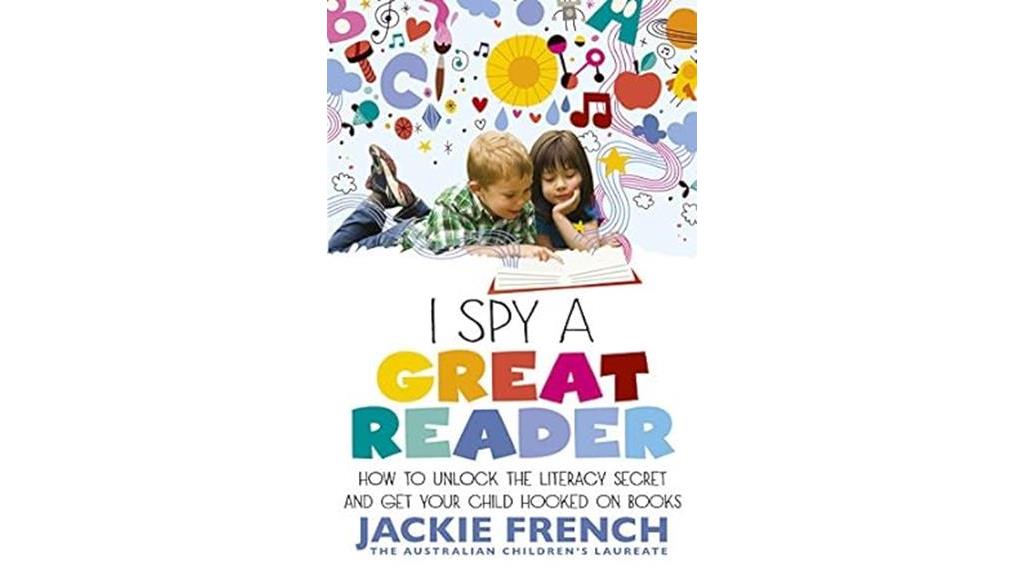
When seeking to reveal the literary secret for your child, 'I Spy a Great Reader: How to Reveal the Literary Secret and Get Your Child Hooked on Books' from the French Parenting Books collection proves to be a valuable resource.
This book offers practical insights for parents and educators on fostering a love for reading in children. While it introduces the concept of 'learning styles,' which may not be universally accepted, the emphasis on adapting information delivery methods to suit different learners is commendable.
Despite some critiques regarding the accuracy of the discussion on learning styles, the overall message of promoting diverse learning approaches is essential for effective education.
Parents and educators can benefit from the book's ideas to support children in cultivating a passion for reading and literacy.
Best For: Parents and educators seeking practical insights on fostering a love for reading in children.
Pros:
- Offers practical insights for promoting reading habits among children.
- Emphasizes the importance of adapting information delivery methods to cater to different learners' needs.
- Provides valuable ideas that can be implemented in practice.
Cons:
- Discusses the concept of 'learning styles' which may not align with traditional teaching methods.
- Some critiques regarding the accuracy of the discussion on learning styles.
- Could benefit from further exploration of evidence-based educational practices.
Factors to Consider When Choosing French Parenting Books

When selecting French parenting books, it's crucial to take into account key selection criteria, examine the content of the book, and take into consideration reader engagement.
These elements can offer valuable insights into the practical applications of the book and its potential impact on your parenting approach.
Key Selection Criteria
Taking into account the author's expertise in parenting or child development is crucial when selecting French parenting books. It guarantees that the information provided is credible and based on sound principles.
Another key criterion to take into consideration is finding books that align with your parenting style and values. This helps in implementing the strategies and tips effectively in your everyday parenting journey.
Checking reviews and ratings from trusted sources or fellow parents can also guide you in choosing the right book. Look for practical tips and strategies that are easy to incorporate into your routine.
Additionally, consider the author's background and expertise in child development and education to ensure reliable information. It's beneficial to select books that resonate with your personal parenting philosophy and values, ensuring they complement your approach.
Moreover, seeking out French parenting books that cover various topics like early childhood development, discipline, and communication strategies can provide a well-rounded perspective on parenting.
Book Content Analysis
In exploring French parenting books, one should focus on the book's exploration of French parenting methods, practical advice for daily implementation, and cultural insights.
When selecting a book, consider how it explores French parenting techniques like discipline, routines, and child-rearing philosophies. Look for practical tips that can be easily applied in your daily life to incorporate these methods into your own parenting style.
Additionally, seek out books that provide cultural insights and comparisons between French and American parenting styles, offering a deeper understanding of different approaches. Consider recommendations and personal experiences shared by the author or other parents who've put the book's principles into practice.
Evaluate how the book impacts parenting strategies, child behavior, and overall family dynamics based on reader reviews and feedback. By analyzing these factors, you can choose a French parenting book that best aligns with your goals and parenting philosophy.
Reader Engagement Factors
Exploring French parenting books involves considering various reader engagement factors that can influence one's choice when selecting a book. Factors such as relatable anecdotes, practical tips, and humor play a significant role in keeping readers interested and invested in the content.
The use of storytelling, personal experiences, and real-life examples can enhance reader engagement by making the information more relatable and engaging. Additionally, providing actionable advice, clear explanations, and relevant information increases reader engagement and retention.
Interactive elements like reflective questions and prompts for self-assessment can also make parenting books more engaging. The writing style, tone, structure of the content, and relevance of the information to the reader's experiences are essential aspects that impact reader engagement.
Compelling storytelling, relatable characters, interactive elements, and engaging design elements like illustrations and layouts can further enhance reader engagement in French parenting books. Incorporating activities, questions, and prompts for reflection keeps readers actively involved and interested in the content.
Practical Application Insights
When considering French parenting books, it's essential to prioritize practical application insights that focus on setting boundaries and promoting independence in children. French parenting emphasizes consistency, respect, and encouragement as fundamental elements for successful parenting.
These books offer strategies for instilling patience, teaching manners, and promoting healthy eating habits. Additionally, tips for managing sibling conflicts, fostering sociability, and promoting self-control are commonly found in French parenting literature.
Practical application insights in French parenting books provide guidance for parents on creating a structured, loving, and respectful environment for children. They often include tips on implementing parenting techniques, fostering independence, and promoting healthy habits.
These insights are based on research, cultural practices, and expert advice, offering actionable advice and hands-on activities to help apply the principles of French parenting in real-life scenarios. Overall, French parenting books equip parents with practical solutions for common parenting challenges, emphasizing the importance of boundaries, open communication, and a strong parent-child relationship.
Impact on Parenting
Considering the impact of French parenting books on my approach, I prioritize selecting literature that aligns with my parenting values and goals.
French parenting books can offer valuable insights into strategies that promote patience, setting boundaries, and fostering independence in children. They emphasize creating a nurturing environment based on respect, discipline, and healthy habits, such as family mealtime and diverse food exposure.
By adopting a structured and authoritative parenting style inspired by French techniques, parents may witness improvements in behavior and relationships with their children. These books also stress the importance of instilling responsibility and self-control in children from a young age through clear boundaries and expectations.
Additionally, French parenting literature encourages promoting self-reliance and adaptability in children to navigate various social situations. Exploring alternative child-rearing practices from French parenting books can help parents enhance their children's emotional intelligence, cognitive development, and overall well-being.
Cultural Relevance
Understanding the cultural relevance of French parenting books is vital when selecting literature to align with your parenting values and goals. French parenting books often emphasize cultural aspects like respect, discipline, and family dynamics unique to French culture. By delving into these books, readers can gain insights into traditional values, social norms, and parenting philosophies specific to France.
It's important to recognize that cultural nuances play a significant role in shaping parenting practices, and embracing these differences can enrich one's own parenting journey. French parenting books may contrast with American or other parenting styles, shedding light on the diverse approaches to child-rearing across different cultures. They highlight values such as independence, respect, and discipline, showcasing how these principles are integrated into parenting in France.
Frequently Asked Questions
Can French Parenting Techniques Be Applied to Children of All Ages?
French parenting techniques can be adapted for children of all ages. The principles of setting boundaries, fostering independence, and promoting respect are universal.
However, the application may vary based on the child's developmental stage. Younger children may require more hands-on guidance, while older children benefit from increased autonomy within structured limits.
Flexibility and personalized adjustments are key to successfully implementing French parenting methods across different age groups.
How Do French Parenting Books Address Discipline and Boundaries?
French parenting books address discipline and boundaries by emphasizing consistent communication, setting clear expectations, and implementing logical consequences.
They often highlight the importance of authoritative parenting, which balances warmth and structure.
These books provide practical strategies for handling challenging behaviors, promoting independence, and fostering respect between parents and children.
Are There Specific Tips for Introducing French Food to Picky Eaters?
When introducing French food to picky eaters, start with simple dishes like crepes or croissants to familiarize them with the flavors.
Gradually introduce more traditional French dishes like ratatouille or quiche, emphasizing the importance of trying new foods.
Get children involved in meal preparation to pique their interest and make them more willing to try different foods.
Encourage a positive attitude towards food exploration to help expand their palate over time.
Do These Books Discuss Cultural Differences in Parenting Approaches?
Yes, these books explore cultural differences in parenting approaches, offering valuable insights into how French parenting styles contrast with others.
They discuss topics like discipline, mealtime routines, and independence fostering.
By examining these cultural nuances, readers can gain a deeper understanding of the underlying principles that shape French parenting practices and how they may differ from their own cultural norms.
This comparative analysis can be enlightening and informative for parents seeking to broaden their parenting perspectives.
How Can Non-French-Speaking Parents Benefit From These Books?
As a non-French-speaking parent, I can benefit from these books by focusing on universal parenting principles rather than language barriers.
Think of these books as a roadmap, guiding us through the diverse terrain of parenting ideologies.
By extracting key concepts and adapting them to our cultural context, we can enrich our parenting toolkit.
Embracing the essence of French parenting, regardless of language fluency, allows us to cultivate a nurturing and supportive environment for our children.
Are French Parenting Books Also Helpful for Parenting Teenagers?
Looking for the best parenting books for teenagers? Many parents have found that French parenting books offer valuable insights and techniques that can be applied to parenting teenagers as well. While not specifically focused on teenage years, these books can provide helpful advice on raising children with respect and boundaries.
Conclusion
To sum up, it's worth noting that French parenting books offer valuable insights and strategies for raising well-rounded children.
One interesting statistic to keep in mind is that French children typically have a lower rate of obesity compared to American children, which highlights the importance of instilling healthy eating habits from a young age.
By incorporating the principles from these books into your own parenting style, you can help create a nurturing and supportive environment for your child's physical, emotional, and intellectual development.
Vetted
15 Best Parenting Guide Books Every Parent Should Read in 2024
Looking for top parenting guide books in 2024? Discover insightful tips and practical advice in "15 Best Parenting Guide Books Every Parent Should Read in 2024" starting with the letter 'L'!

Essential reads for 2024 are right here! **”Raising Good Humans”** serves up smart tips to upgrade your parenting game. **”The Montessori Baby”** highlights respecting kids’ growth with practical advice. **”Help! I’m A New Mom”** gives gold on baby care and post-birth healing. **”The Family Virtues Guide”** teaches virtues without shame. Check these books out for a fulfilling parenting journey!
Key Takeaways
- "The Simplest Baby Book in the World" for practical advice and confidence boost.
- "Raising Good Humans" for insightful content and improved parenting skills.
- "Mayo Clinic Guide to Your Baby's First Years" for scientifically grounded information.
- "The Montessori Baby" for individual child development and practical suggestions.
- "What to Expect the First Year" for a detailed month-by-month guide and registry tips.
The Simplest Baby Book in the World: The Illustrated, Grab-and-Do Guide for a Healthy, Happy Baby
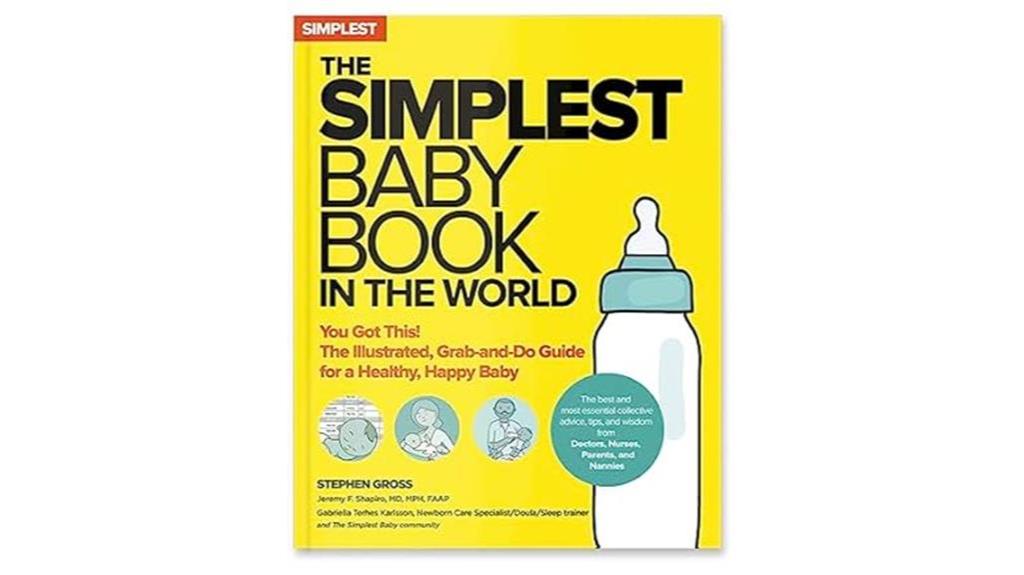
For first-time parents seeking a straightforward and practical guide, 'The Simplest Baby Book in the World' is the ideal choice. This book has garnered overall positive feedback for its simplicity and helpfulness. It offers great illustrations alongside practical advice, making it easy to read and informative, which is highly recommended for new parents like myself.
The content and format of the book provide both basic and more involved care strategies in an easy-to-follow manner with no-frills illustrations. It covers essential information for newborn care and even lists 'must-haves' for each stage of growth, which is incredibly useful.
Personally, I found this book to answer the majority of my first questions, saving me time from searching the internet and helping me create my baby registry. It truly boosts confidence for new parents embarking on this exciting journey.
Best For: First-time parents seeking a straightforward and practical guide for newborn care.
Pros:
- Simple and helpful for new parents.
- Great illustrations and practical advice.
- Covers essential information and provides care strategies for each stage of growth.
Cons:
- May not contain in-depth or advanced parenting information.
- Limited scope compared to more comprehensive baby care books.
- Not suitable for experienced parents looking for advanced strategies.
Raising Good Humans: A Mindful Guide to Breaking the Cycle of Reactive Parenting
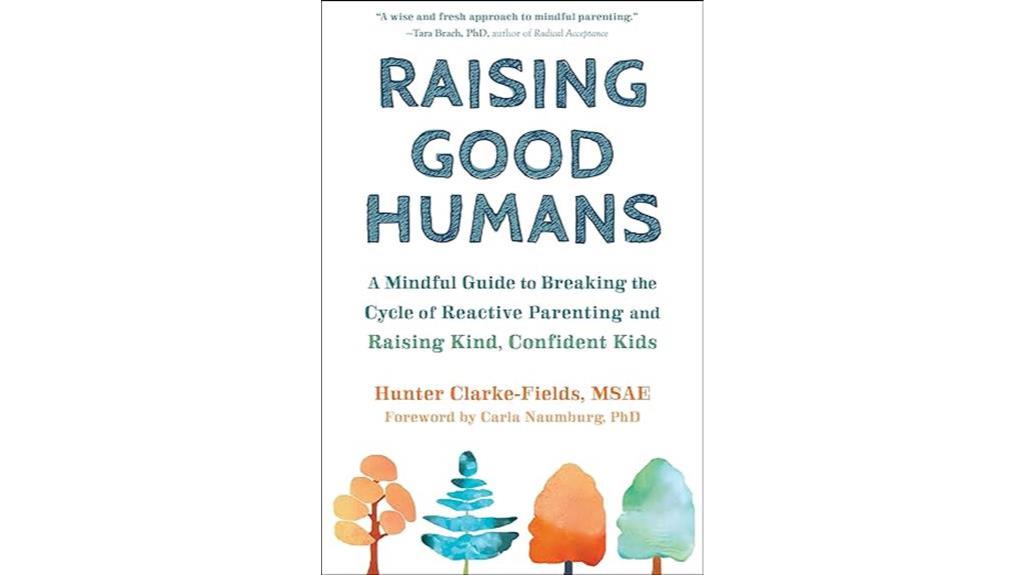
This guidebook on breaking the cycle of reactive parenting is a must-read for parents seeking to raise confident and emotionally resilient children in 2024.
'Raising Good Humans: A Mindful Guide to Breaking the Cycle of Reactive Parenting' has received positive reviews and recommendations for its insightful and engaging content. Readers highlight the book's impact on changing parenting approaches, especially in handling challenging moments with children.
While some readers face challenges in unlearning past parenting practices, the book emphasizes self-work and mindfulness as essential tools. Personal experiences shared by readers showcase how the book aids in identifying triggers and improving parenting skills through self-reflection.
Specific techniques like using 'I language' and practicing mindfulness are lauded for their effectiveness in nurturing positive parent-child relationships.
Best For: Parents looking to break the cycle of reactive parenting and raise confident, emotionally resilient children.
Pros:
- Insightful and engaging content.
- Effective in changing parenting approaches and handling challenging moments.
- Helps in identifying triggers and improving parenting skills through self-reflection.
Cons:
- Some readers may find it challenging to unlearn past parenting practices.
- Emphasizes self-work and mindfulness, which may be initially difficult for some.
- Specific techniques like 'I language' and mindfulness practices might not resonate with all readers.
Mayo Clinic Guide to Your Baby's First Years, 2nd Edition
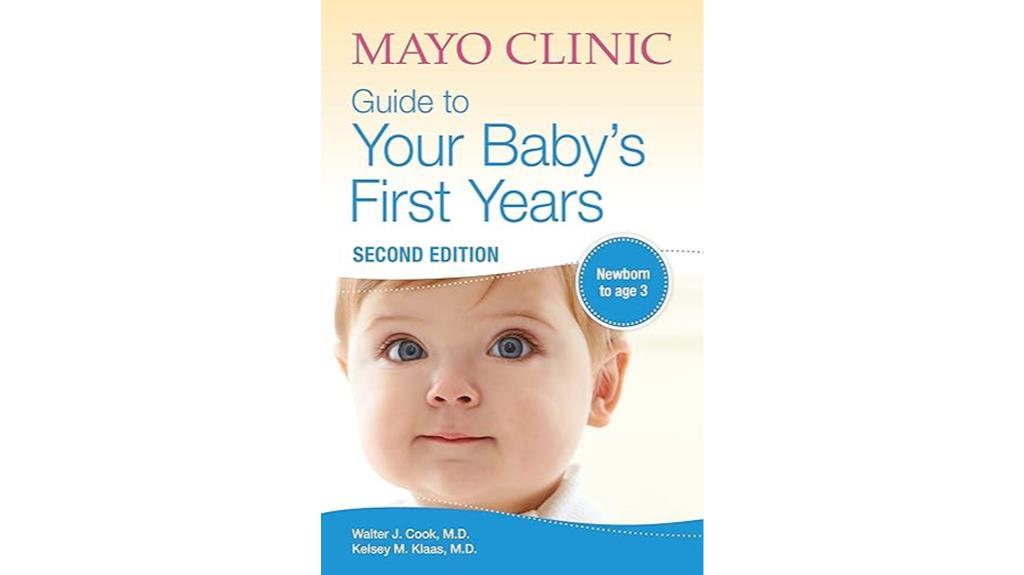
Guiding through the early stages of parenthood with dependable advice and practical insights, the Mayo Clinic Guide to Your Baby's First Years, 2nd Edition stands out as an invaluable resource for new parents seeking thorough information and support.
This well-organized book offers scientifically grounded content in a simple, practical manner, making it accessible to all readers. With the use of illustrations and diagrams, complex topics are broken down for easier understanding.
The book also highlights expected milestones for each month of your baby's development, allowing parents to track progress effectively. Whether you prefer to read selectively or cover every detail, this guide caters to your needs.
Backed by positive user reviews and professional approval, the Mayo Clinic Guide proves to be a detailed and essential reference for guiding through the early years of parenting.
Best For: New parents seeking a comprehensive and user-friendly guide for navigating their baby's first years with confidence.
Pros:
- Well-organized structure for easy access to information.
- Scientifically grounded content presented in a practical manner.
- Useful illustrations and diagrams for enhanced understanding.
Cons:
- Might be overwhelming for parents who prefer more concise information.
- Could benefit from more personal anecdotes or real-life examples.
- Some readers may find the content repetitive if they have prior experience with parenting resources.
The Montessori Baby: A Parents Guide to Nurturing Your Baby
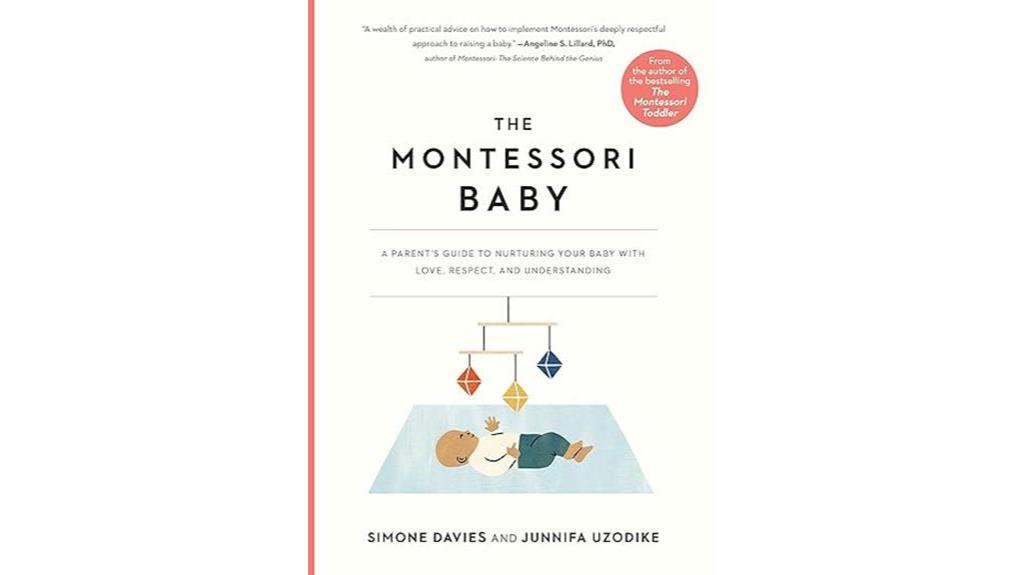
Curious about fostering independence and a love for learning in your baby? The Montessori Baby is a valuable resource for parents interested in implementing the Montessori method with their infants and toddlers. Authored by Simone Davies, a Montessori teacher, this guide emphasizes principles like respecting the child's individual development and creating a prepared environment conducive to learning.
Divided into three parts, the book offers practical examples and suggestions for incorporating Montessori practices into daily routines. While it advocates for parental investment in these principles, it may be overwhelming for newcomers to the Montessori approach.
However, testimonials from parents highlight the positive impact of following the book's advice, leading to improved sleep patterns and increased independence in their babies. Overall, this guide is recommended for caregivers seeking to apply Montessori principles in nurturing young children.
Best For: Parents and caregivers seeking to foster independence and a love for learning in their infants and toddlers through the Montessori method.
Pros:
- Emphasizes observation and respect for individual child development.
- Provides practical examples and suggestions for implementing Montessori practices.
- Well-organized, easy to navigate, and includes helpful summaries and bullet points.
Cons:
- May be overwhelming for those new to the Montessori approach.
- Emphasizes the need for primary caregivers to be heavily invested in the principles outlined.
- Pressure to create a perfect Montessori environment may be felt by some parents.
The New York Times Parents Guide to the Best Books for Children: 3rd Edition Revised and Updated
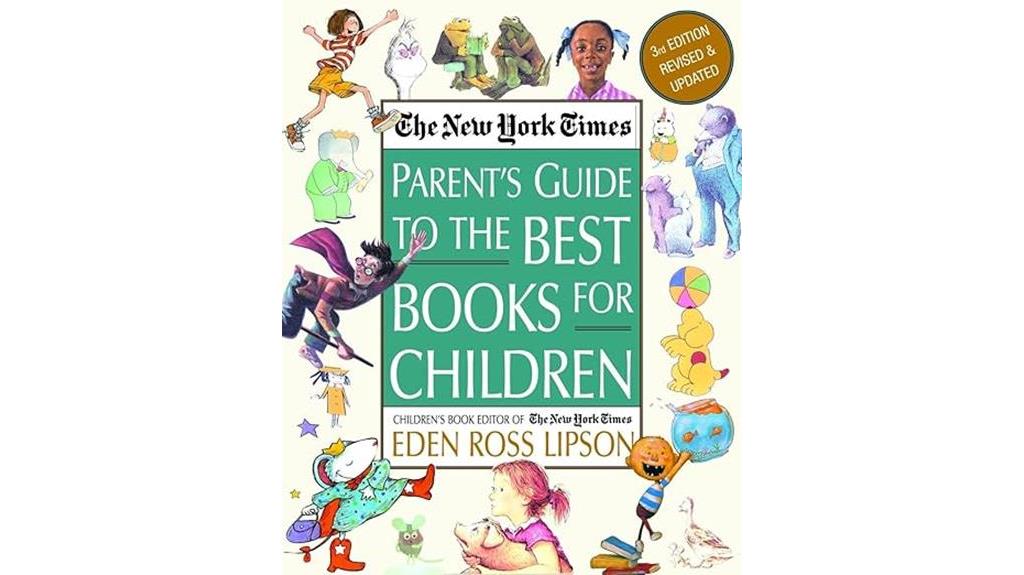
The New York Times Parents Guide to the Best Books for Children: 3rd Edition Revised and Updated offers a thorough resource for parents seeking quality literature recommendations for their children. With helpful descriptions and indexes for different age ranges and topics, this book serves as a valuable tool for selecting books that cater to a child's interests and developmental stage.
While readers appreciate the classic and new book recommendations, some express a desire for updated editions that include contemporary authors and republished old favorites. Criticisms include suggestions for clearer organization, more detailed information on each book, and a more modern format to enhance usability.
Despite these critiques, many find this guide to be an invaluable resource for anyone interested in children's literature, although some note omissions of acclaimed titles and authors that could enhance its value.
Best For: Parents and caregivers looking for a comprehensive guide to selecting quality children's books.
Pros:
- Provides helpful descriptions of stories for parents and children.
- Serves as a valuable reference for selecting quality books for children.
- Helpful indexes for age ranges and topics make it easy to find suitable books.
Cons:
- Lack of information such as age levels and page counts for each book.
- Vagueness of categories in the main listing may lead to confusion.
- Outdated format and organization could be improved for better usability.
The ADHD Parenting Guide for Boys: From Toddlers to Teens
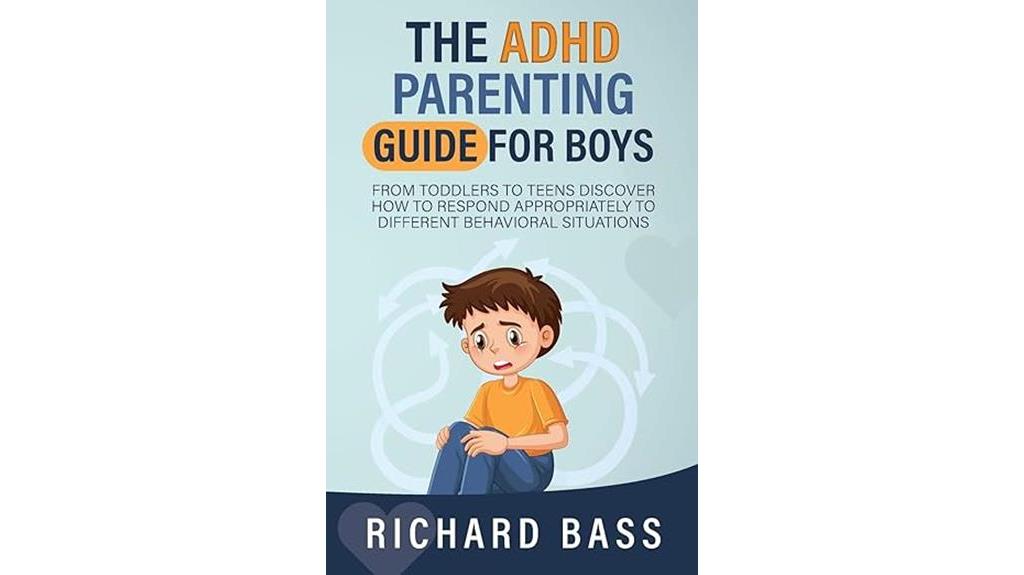
For parents facing the challenges of raising boys with ADHD, 'The ADHD Parenting Guide for Boys' by Richard Bass stands out as an invaluable resource in 2024. This practical guide offers tailored strategies for different age groups, from toddlers to teens, empowering parents to nurture positive behaviors, emotional intelligence, and strong relationships with their sons.
Parent testimonials highlight the book's helpfulness, practicality, and insightful perspective on parenting children with ADHD. Readers appreciate the actionable strategies, reassurance, and understanding it provides for handling their child's behavior effectively.
By offering age-appropriate tips and fostering a sense of community and support, this book is highly recommended for parents seeking to connect with their children, respond appropriately, and navigate the complexities of ADHD parenting with confidence.
Best For: Parents of boys with ADHD looking for practical strategies and guidance tailored to different age groups, from toddlers to teens.
Pros:
- Tailored strategies for specific age groups from toddlers to teens.
- Empowers parents to foster positive behaviors and strong relationships with their sons.
- Offers actionable tips and reassurance for handling children's behavior effectively.
Cons:
- May not cover every possible scenario or unique situation.
- Focuses specifically on boys with ADHD, may not be as applicable for girls with ADHD.
- Requires active implementation and consistency from parents to see results.
Cribsheet: A Data-Driven Guide to Better, More Relaxed Parenting
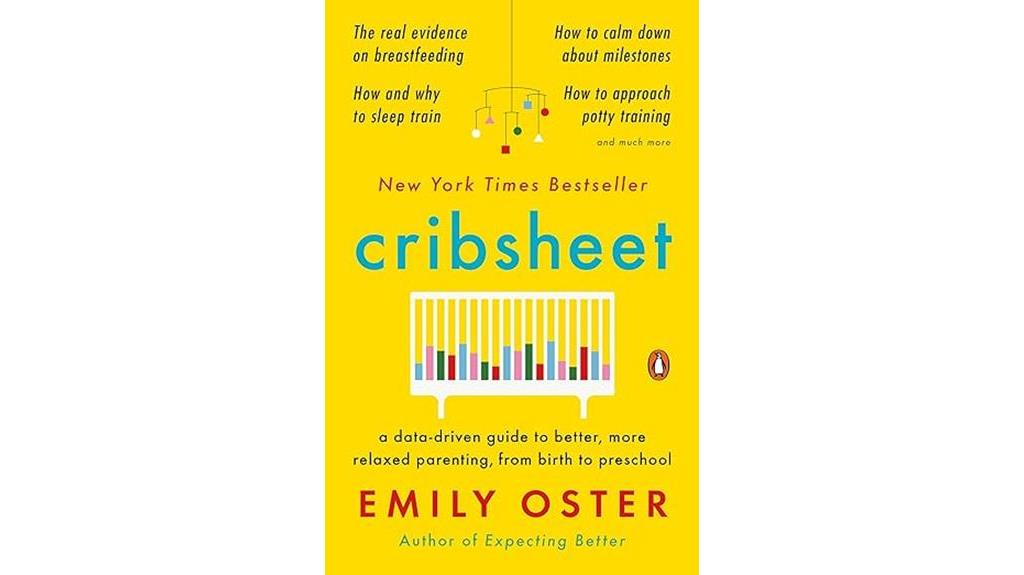
Perfect for data-driven and analytical individuals, the 'Parenting Guide Books for 2024' provides a thorough and user-friendly approach to traversing parenthood.
'Cribsheet: A Data-Driven Guide to Better, More Relaxed Parenting' has garnered positive reviews for its thoughtful insights and support for new parents. While some readers appreciate the book's data-oriented approach and relatable style, others have criticized certain sections for lacking evidence-based information, particularly in the breastfeeding domain.
Despite some personal experiences overshadowing the data-driven content, the book still offers valuable perspectives and guidance supported by statistics and research. With an unbiased presentation and a scientific appeal, 'Cribsheet' is praised for its easy-to-understand format, humor, and insightful take on various parenting topics.
However, there are calls for the book to be available in multiple languages to cater to a more diverse readership.
Best For: Data-driven and analytical individuals seeking a comprehensive and user-friendly approach to navigating parenthood.
Pros:
- Offers thoughtful insights and support for new parents.
- Relatable style that makes complex topics easy to understand.
- Provides valuable perspectives and guidance supported by statistics and research.
Cons:
- Some sections lack evidence-based information, particularly in the breastfeeding domain.
- Personal experiences may overshadow the data-driven content.
- The book's impact may cause anxiety in first-time moms.
1-2-3 Magic: Gentle Child & Toddler Discipline for Happy Parenting
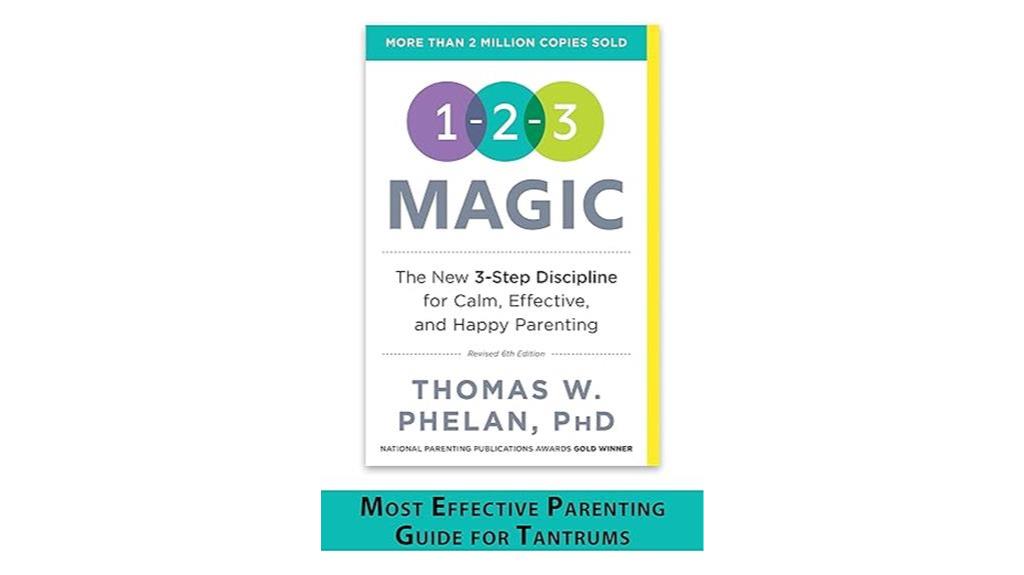
An essential resource for parents seeking a gentle and effective discipline approach for managing child and toddler behavior is the book '1-2-3 Magic: Gentle Child & Toddler Discipline for Happy Parenting'. This book provides practical strategies for handling challenging behaviors in a calm and structured manner.
Parents have shared how implementing the 1-2-3 Magic method has positively impacted their parenting approach, leading to improved communication and better understanding of boundaries. The method emphasizes simplicity and consistency, focusing on setting clear expectations for children. Testimonials highlight the effectiveness of using 'if/then' statements instead of traditional counting methods.
Additionally, the book offers insights into adapting the approach for children with special needs, making it a valuable resource for parents, educators, and caregivers alike.
Best For: Parents seeking a gentle and effective discipline approach for managing child and toddler behavior.
Pros:
- Provides practical strategies for handling challenging behaviors in a calm and structured manner.
- Emphasizes simplicity, consistency, and setting clear expectations for children.
- Offers insights into adapting the approach for children with special needs, making it a valuable resource for various caregivers.
Cons:
- May require time and patience to consistently implement the method.
- Some children may not respond as effectively to the 1-2-3 Magic approach.
- Additional support or guidance may be needed for parents facing complex behavioral issues.
What to Expect the First Year: (Updated in 2023)
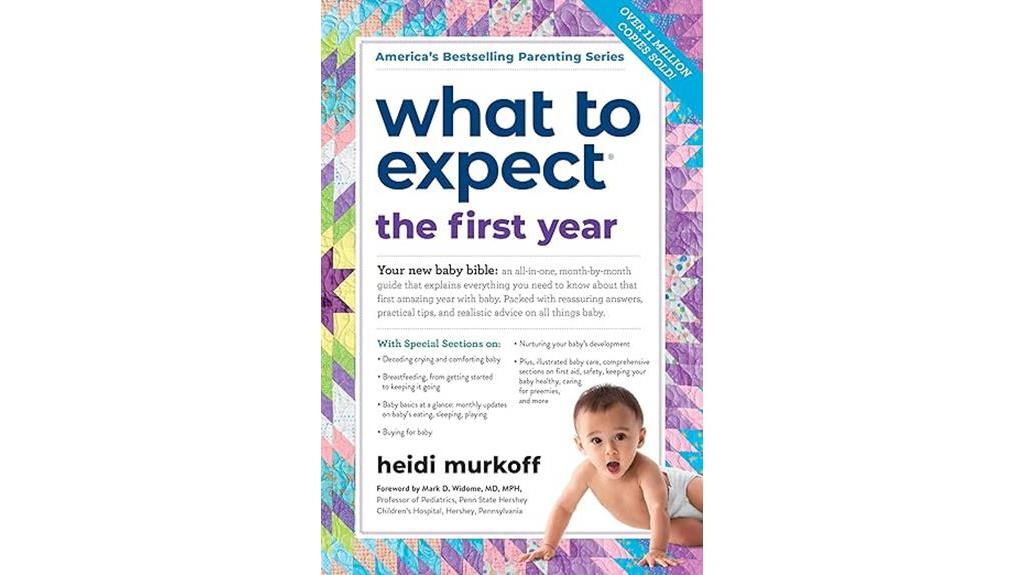
The updated 2023 edition of 'What to Expect the First Year' is a must-have for new mothers seeking a thorough month-by-month guide. This book has garnered positive reviews for its organization and wealth of information, which can help alleviate anxiety and mentally prepare parents.
It covers various relevant topics for each month of the baby's first year, making it an all-encompassing resource. While the content may be dense for cover-to-cover reading before the baby arrives, it serves as a valuable reference later on.
With a soft hardcover and user-friendly format, this book is well-suited for American healthcare settings. Many first-time mothers have found it invaluable for navigating the early stages of parenthood, making it a recommended read for new moms.
Best For: New mothers seeking a comprehensive month-by-month guide during their baby's first year.
Pros:
- Well-organized and informative content
- Detailed month-by-month guide for the first year
- Useful for curating a registry and preparing mentally
Cons:
- Content may be too dense for cover-to-cover reading pre-baby
- More suitable for reference rather than continuous reading
- Considerations about accessing information online versus using the book
The ADHD Parenting Guide for Girls: From Toddlers to Teens
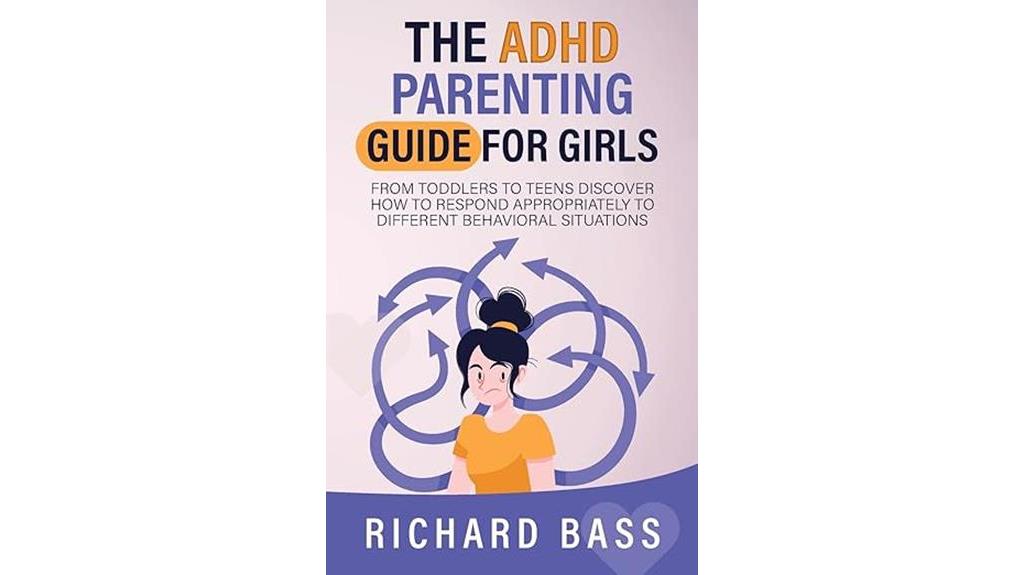
For parents seeking practical strategies to support their daughters with ADHD from toddlers to teens, 'The ADHD Parenting Guide for Girls' is an invaluable resource providing insights and guidance. This book offers a wealth of information to help parents understand and assist their daughters with ADHD.
From explaining the unique challenges girls with ADHD face to providing tips on positive parenting approaches, this guide covers a broad range of topics essential for supporting girls with ADHD. It emphasizes the significance of early diagnosis and parental support, stressing the importance of fostering strong relationships with daughters throughout their developmental stages.
By focusing specifically on girls with ADHD, this book fills a valuable niche in the literature, highlighting the need for tailored strategies to address the needs of these individuals.
Best For: Parents of girls with ADHD looking for practical guidance and support from toddlers to teens.
Pros:
- Valuable insights and practical tips for understanding and supporting daughters with ADHD.
- Emphasis on early diagnosis and parental guidance to address challenges effectively.
- Focused approach on girls with ADHD, providing tailored strategies for their unique needs.
Cons:
- Might not cover every individual case or situation.
- Limited focus on specific age groups within the toddler to teen range.
- Additional resources or support may be needed for more complex cases.
We're Parents! First-Time Dads Guide to Baby's First Year: Everything You Need to Know
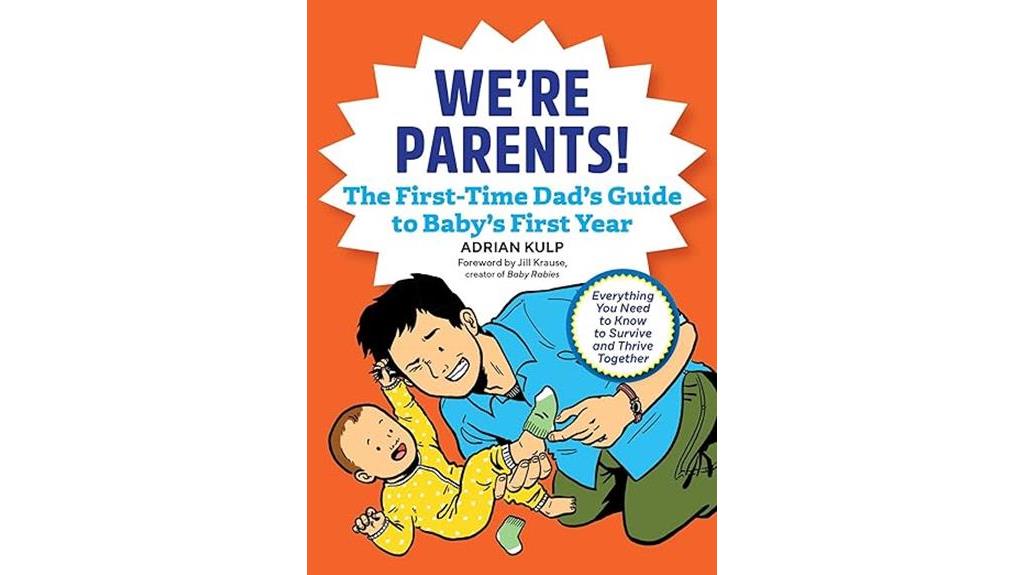
If you're a first-time dad feeling overwhelmed by the prospect of your baby's first year, 'We're Parents! First-Time Dads Guide to Baby's First Year: Everything You Need to Know' is your go-to resource for practical advice and support. This book has garnered positive reviews for being recommended to new parents who feel lost, offering good reminders and guidance on how dads can support both mom and baby.
It's praised for its easy-to-read format, providing straightforward and practical advice that many find funny, clear, and useful. Personal experiences shared by readers highlight how the book aligns with their weekly challenges and helps navigate difficult times.
While some critics mention its heavy focus on the American system and a somewhat patronizing tone, overall, this guide is considered a valuable tool for first-time dads seeking non-prescriptive and digestible parenting advice.
Best For: New dads who are looking for practical advice and support during their baby's first year.
Pros:
- Recommended for overwhelmed new parents.
- Provides good reminders and guidance for dads to support mom and baby.
- Easy to read and understand, with practical advice.
Cons:
- Some find the book overly focused on the American system.
- Described as strangely written and somewhat patronizing.
- May not resonate with all readers due to its tone.
The Whole-Brain Child: 12 Revolutionary Strategies to Nurture Your Child's Developing Mind
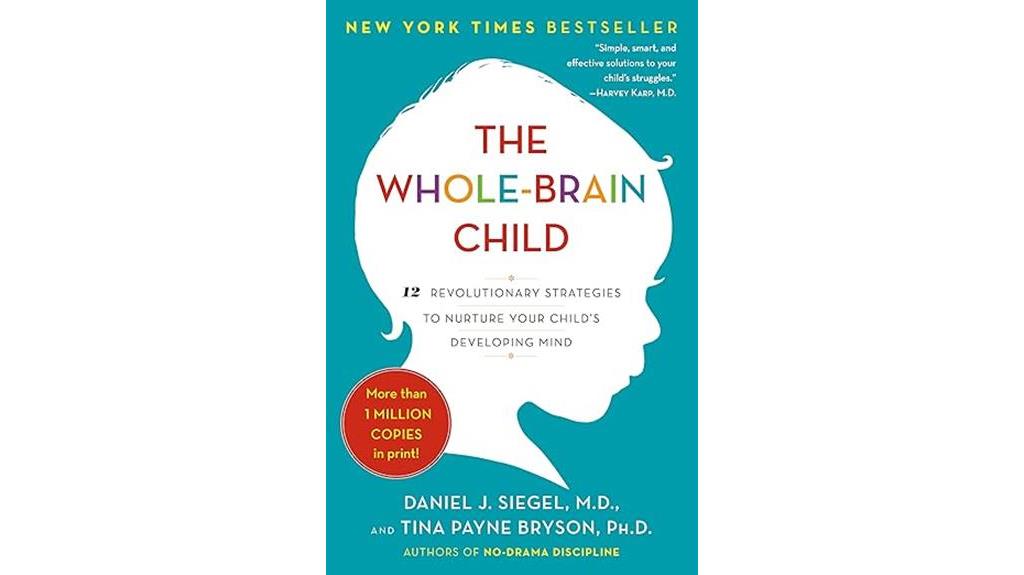
A must-have choice for parents seeking practical strategies to enhance their understanding of their child's developing mind is the 'Parenting Guide Books for 2024'.
'The Whole-Brain Child: 12 Revolutionary Strategies to Nurture Your Child's Developing Mind' has revolutionized parenting approaches by providing strategies that explore the complexities of a child's brain, emotions, and behaviors. Parents can create new neural pathways to assist their children in addressing challenges effectively. This book offers easily understood techniques that yield positive outcomes, aiding parents in managing high-anxiety situations and enhancing their emotional intelligence.
With an approachable structure and simplified language, the book translates intricate neuroscience into actionable advice for a broad audience. Therapists hail it as a game-changer, recommending it for all parents to gain a deeper understanding of child behavior and brain development.
Best For: Parents seeking practical strategies to understand and nurture their child's developing mind.
Pros:
- Provides easy-to-understand techniques for positive outcomes.
- Offers insights into child brain development in a well-structured manner.
- Translates complex neuroscience into actionable advice for a general audience.
Cons:
- Requires substantial effort for implementing the strategies.
- May not address all parenting situations comprehensively.
- Critiqued for its target audience and practicality of strategies.
Beginners Guide on Parenting Children with ADHD: Modern Approach to Understand and Lead Your Hyperactive Child to Success

The 'Parenting Guide Books for 2024' offers a modern approach tailored for parents managing the world of raising children with ADHD. This book has received positive reviews for its helpful content and clear guidance, making it suitable for beginners.
While some critics mention a lack of concrete suggestions and depth in evidence-based strategies, many readers find it valuable for understanding and supporting their ADHD children. The therapy methods highlighted in the book have been successful for many parents, emphasizing the importance of wise guidance for children with ADHD.
With a focus on helping ADHD children thrive, this book provides a brief rationale and insights into the attributes of those with ADHD, though some readers feel it could offer more practical advice for day-to-day challenges.
Best For: Parents of ADHD children looking for a beginner-friendly guide with a modern approach to understanding and supporting their hyperactive child.
Pros:
- Offers valuable content and clear guidance suitable for beginners.
- Emphasizes successful therapy methods for parents to incorporate.
- Provides insights into the attributes of ADHD children to help parents navigate challenges.
Cons:
- Lacks concrete suggestions and evidence-based strategies for practical application.
- Some readers may find the content lightweight and lacking in-depth information.
- Could benefit from more practical advice for day-to-day parenting of ADHD children.
Help! I'm A New Mom: A First-Time Mother's Guide to Mastering Newborn Care and Postpartum Recovery
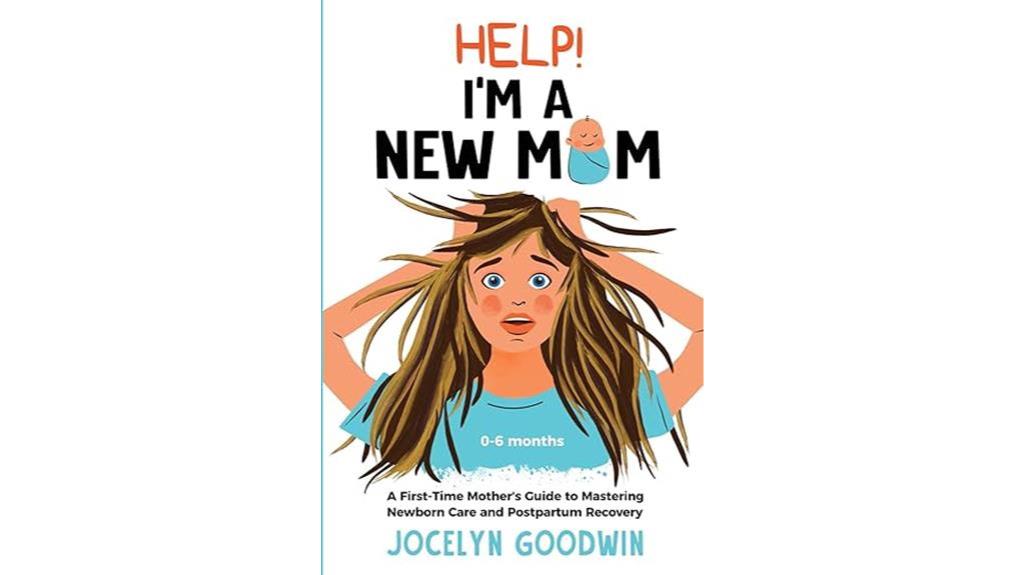
Ideal for new moms seeking a thorough and supportive guide to navigate the challenges of newborn care and postpartum recovery, the 'Parenting Guide Books for 2024' offers invaluable insights and practical advice. This book has received positive reviews for being helpful, down-to-earth, and realistic, providing super helpful tips in a well-organized manner.
It covers various aspects of newborn care and personal care for parents, making it a great gift for new moms. With a week-by-week breakdown of what to expect and how to handle different situations, it serves as a useful reference guide for new parents.
While some mixed reviews suggest it may not offer new insights for those well-versed in parenting books, it remains highly recommended by first-time moms and serves as a valuable resource for expecting parents.
Best For: New moms who are seeking a comprehensive and supportive guide to navigate newborn care and postpartum recovery.
Pros:
- Offers invaluable insights and practical advice for new moms.
- Well-organized with a week-by-week breakdown of what to expect.
- Provides super helpful tips and covers various aspects of newborn care and personal care for parents.
Cons:
- May not offer new insights for those experienced with parenting books.
- Mixed reviews suggest it might not be as beneficial if other parenting books have been read.
- Some readers may find the content more geared towards expecting parents rather than those already experienced in parenthood.
The Family Virtues Guide
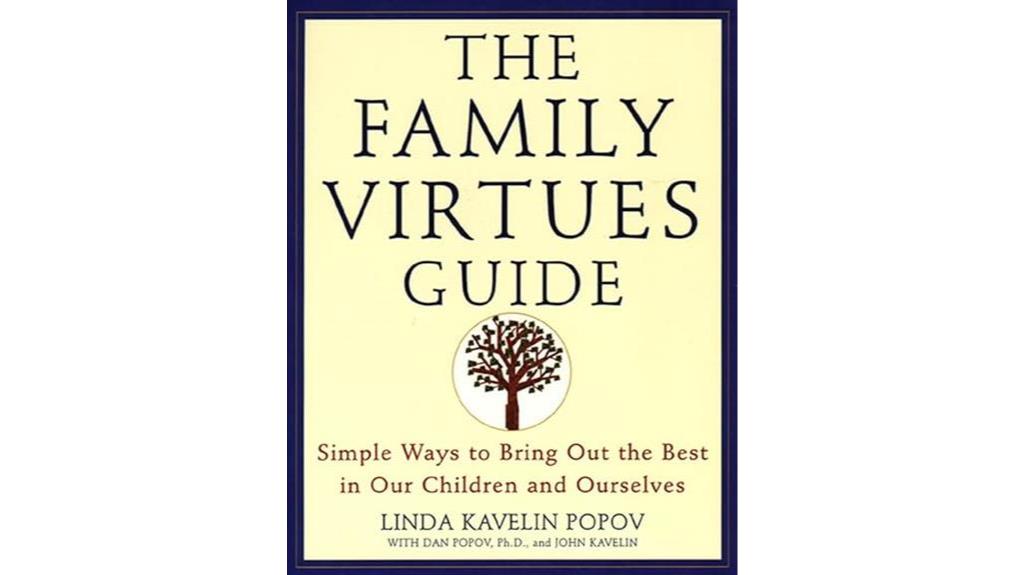
Highly recommended for families seeking a practical approach to instilling virtues in their children, the Family Virtues Guide provides a transformative resource for character development.
This Bahai-inspired book promotes virtues within families by encouraging discussions and activities centered around values like assertiveness, caring, compassion, courage, honesty, and kindness.
By shifting away from shaming methods and focusing on guiding children towards virtues, this book offers specific examples and practical advice for parents and teachers to implement these virtues in daily life effectively.
The Virtues Project, a global initiative founded in Canada in 1991, supports the book's teachings by promoting kindness, justice, and integrity worldwide.
Readers praise the Family Virtues Guide for its positive impact on children's behavior and the meaningful discussions it sparks within families.
Best For: Families, educators, and individuals seeking a practical and transformative approach to instilling virtues and fostering positive character development.
Pros:
- Encourages discussions and activities centered around virtues like assertiveness, caring, compassion, courage, honesty, and kindness.
- Shifts focus from shaming methods to guiding children towards virtues.
- Specific examples and practical advice provided for effective implementation of virtues in daily life.
Cons:
- Some readers may find religious undertones in the book, which might not align with their beliefs.
- Requires consistent effort and commitment to see significant changes in behavior and family dynamics.
- Not all virtues may resonate with every individual, leading to varying levels of engagement.
Factors to Consider When Choosing Parenting Guide Books

When contemplating parenting guide books, it's crucial to have a clear set of selection criteria in mind.
Key considerations such as the author's credibility, the book's relevance to your parenting style, and the practicality of the advice provided should guide your decision-making process.
Choosing wisely based on these decision-making factors guarantees that the book you pick has the essential features to support you on your parenting journey.
Selection Criteria
I consider various factors when choosing parenting guide books, making sure they align with my values and parenting style for practical applicability.
To begin with, I prioritize the expertise of the author, looking for qualifications in child development or psychology to guarantee credibility.
Next, I seek books that resonate with my parenting style and values, as this alignment enhances the book's relevance to my specific needs.
Additionally, I opt for updated editions to access the latest research and information in the field of parenting, ensuring I'm informed about current best practices.
Moreover, I pay attention to the organization and readability of the book. A well-structured and easily navigable guide enhances my understanding and implementation of the content.
Lastly, seeking recommendations from trusted sources like parenting forums, professionals, or friends who've benefited from the book's advice adds a valuable layer of assurance before making my selection.
Key Considerations
Taking into account the expertise and credibility of the author is an essential factor when selecting parenting guide books. Look for authors who've qualifications in child development, psychology, or related fields as this indicates a solid understanding of parenting dynamics.
It's important to evaluate the approach and philosophy of the guide to guarantee it resonates with your parenting style and values. Practicality and relevance are key considerations; opt for guides that provide actionable advice and strategies that can be applied to your specific parenting challenges.
Additionally, check for inclusivity and diversity in the content to make sure that a wide range of parenting experiences and family structures are addressed. Reviews and recommendations from other parents or professionals can also offer valuable insights into the effectiveness and impact of the parenting guide.
Choosing Wisely
Taking into account factors like the author's expertise, alignment with personal values, publication date, specific topics covered, and recommendations from trusted sources is vital when selecting parenting guide books.
When considering the author's background, look for individuals with expertise in child development or parenting to guarantee the advice provided is reliable and credible. It's also essential to choose books that resonate with your parenting style and values, as this alignment can make the guidance more practical and applicable to your family dynamic.
Checking the publication date is important to make sure that the information reflects current best practices in parenting. Additionally, opt for books that address specific challenges or topics you're interested in, such as discipline, child development, or special needs parenting.
Seeking recommendations from trusted sources like fellow parents, educators, or healthcare professionals can lead you to books that have proven beneficial and impactful to others. By considering these factors thoughtfully, you can choose parenting guide books that cater to your unique needs and preferences.
Decision-Making Factors
Taking into account the author's credentials and expertise in child development or parenting is vital when selecting parenting guide books. Ensuring that the advice comes from a knowledgeable source increases the likelihood of receiving reliable information that can positively impact your parenting journey.
Additionally, it's important to choose books that resonate with your parenting style and values. By aligning the book's guidance with your beliefs, you can make the advice more practical and applicable to your unique situation.
Checking the publication date is another significant factor to take into account. Opting for books that are up-to-date ensures that you're receiving information relevant to current parenting practices.
Moreover, evaluating the organization and format of the book is key. Selecting a book that matches your reading preferences and learning style can enhance your overall experience and understanding.
Lastly, seeking recommendations from trusted sources such as parenting websites, professionals, or other parents can lead you to books with proven effectiveness, guiding you towards resources that have made a positive impact on others in similar situations.
Essential Book Features
When selecting parenting guide books, it's crucial to consider essential book features that cater to your specific needs and preferences. Look for books that offer practical advice and tips which you can easily incorporate into your daily parenting routine.
Consider texts that cover a wide array of topics, from newborn care to handling challenging behaviors in older children. It's important to choose books that resonate with your parenting style and values for a better connection.
Opt for guides that focus on specific age groups or developmental stages relevant to your child to guarantee the advice is tailored to your situation. Seek out books that provide a balance of expert advice, personal experiences, and research-based information to offer a well-rounded perspective.
Frequently Asked Questions
How Can I Help My Child Develop Emotional Intelligence?
To help my child develop emotional intelligence, I focus on validating their feelings, teaching them to identify and express emotions, and modeling healthy emotional regulation.
I engage in open dialogues, encourage empathy towards others, and provide coping strategies for managing stress and conflicts.
What Are Some Practical Strategies for Managing ADHD in Children?
When managing ADHD in children, I find structure essential. Establishing routines helps maintain consistency and predictability.
Break tasks into smaller steps, offering clear instructions and positive reinforcement. Utilize visual aids and timers to aid in focus.
Regular exercise and healthy eating habits can also make a difference. Communication with teachers and healthcare professionals is vital to tailor interventions.
Is There a Guide Specifically for First-Time Dads?
Yes, there's a guide tailored for first-time dads. It covers topics like bonding with your baby, managing changing roles, and offering support to your partner.
This guide provides practical advice on handling the challenges of fatherhood, from diaper changing to bedtime routines.
It's a helpful resource for new dads looking to confidently manage the exciting journey of parenthood.
How Can I Choose the Right Parenting Guide Book for My Family?
To choose the right parenting guide book for my family, I focus on our unique needs and values. I consider the author's expertise, the book's approachability, and reviews from trusted sources.
Symbolically, this process is like finding a compass in a vast sea of information, guiding me towards resources that resonate with our parenting style and goals. Taking time to research and compare options helps me select a book that aligns well with our family dynamics.
What Are Some Key Factors to Consider When Selecting a Parenting Guide Book?
When choosing a parenting guide book, it is important to consider the author's credentials. Ensure they have expertise in child development.
Content relevance to your parenting style and the age of your child is essential. Prioritize books with practical tips, real-life examples, and actionable advice.
Reviews from trusted sources and other parents can guide your decision. Assess the book's readability and engaging style to ensure it resonates with you and keeps you motivated.
Are the Parenting Guide Books for 2024 Suitable for Newborns as Well?
Looking for the best parenting books for newborns for the year 2024? Make sure to choose a guide that is specifically tailored to the needs of newborns. While some parenting books may be suitable for newborns, it’s always best to find one that provides the most up-to-date information and advice for this crucial stage.
Conclusion
To sum up, these 15 parenting guide books provide a wealth of knowledge and practical advice for parents as they navigate the challenges of raising children.
Whether you're seeking guidance on newborn care, mindful parenting, or understanding ADHD, there's a book on this list to meet your needs.
By reading and implementing the strategies outlined in these books, parents can create a nurturing and supportive environment for their children, preparing them for success in the future.
-

 Parenting Styles1 week ago
Parenting Styles1 week agoWorst Parenting Style: Impact on Child Development
-

 Parenting Styles1 week ago
Parenting Styles1 week ago2023 Indiana Parenting Time Guidelines Update
-

 Vetted7 days ago
Vetted7 days ago15 Best Books on Step Parenting Every Blended Family Needs to Read
-

 Parenting Tips6 days ago
Parenting Tips6 days agoUnequal Responsibilities: When One Parent Does All the Parenting
-

 Parenting Tips1 week ago
Parenting Tips1 week agoFostering Love: How Much Do You Get Paid for Foster Parenting?
-

 Vetted18 hours ago
Vetted18 hours ago15 Best Co-Parenting Books Every Parent Should Read for Successful Co-Parenting
-

 Vetted6 days ago
Vetted6 days ago15 Best Parenting Books of All Time Every Parent Should Read
-

 Vetted6 days ago
Vetted6 days ago15 Best Books for Gentle Parenting Every Parent Should Read

















